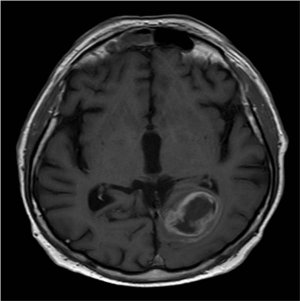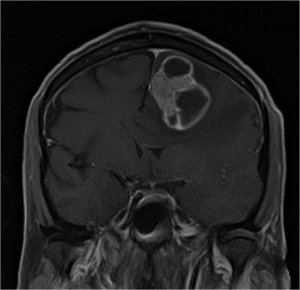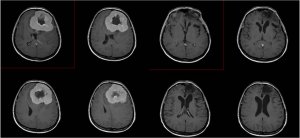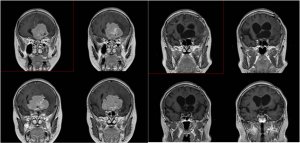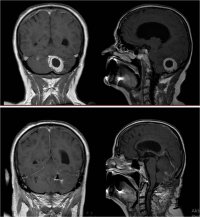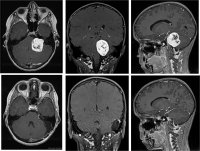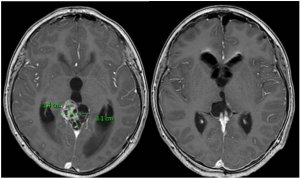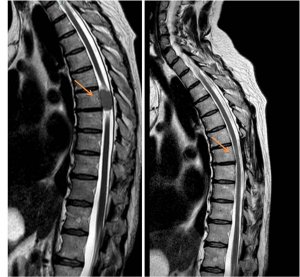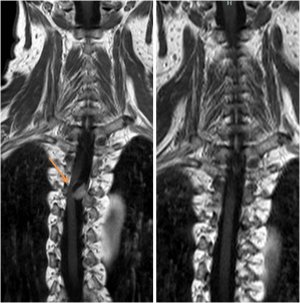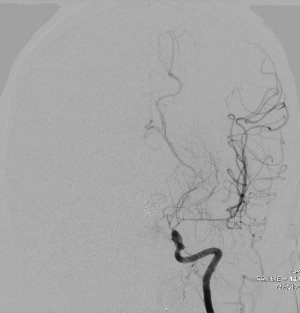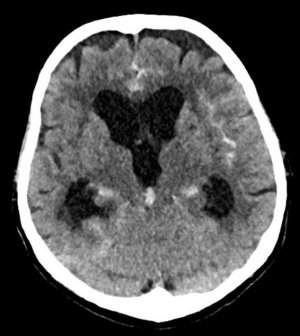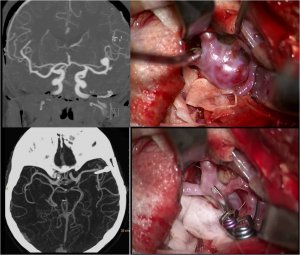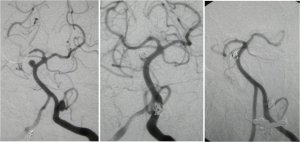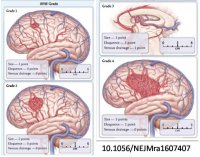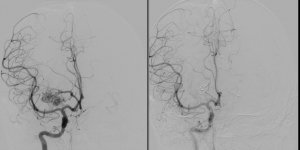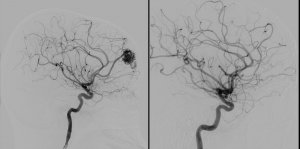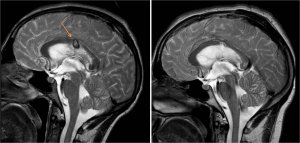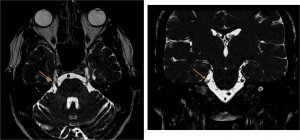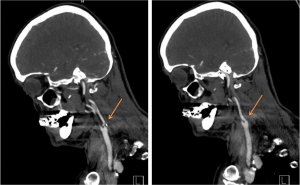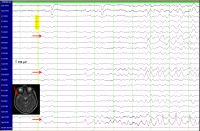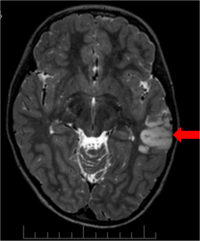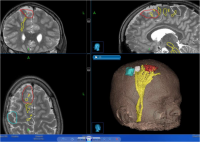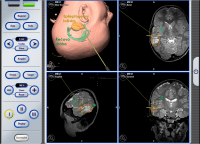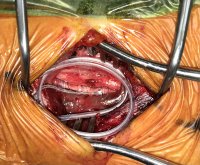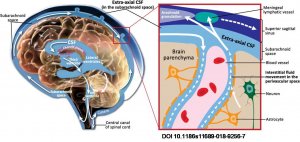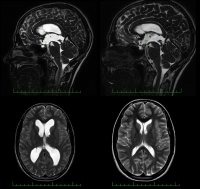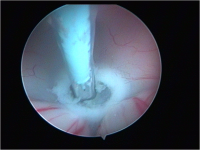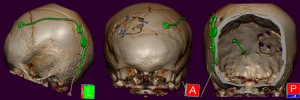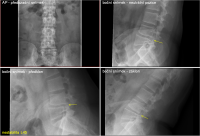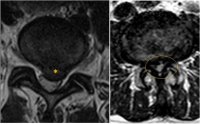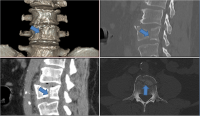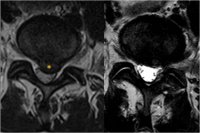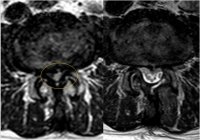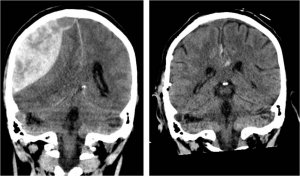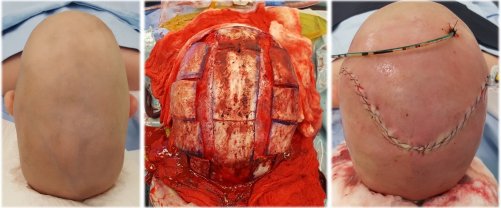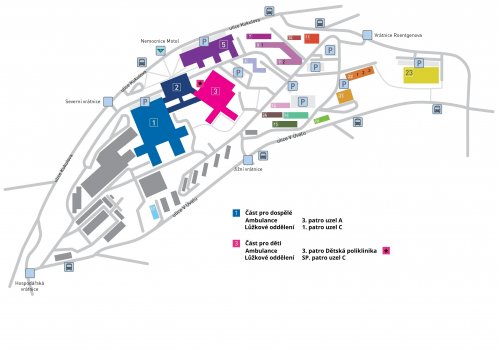- Basic information
- Clinic management and staff
- Professional ambulances
- Department for children
- Department for adults
- Operating rooms
- Clinic program
- Surgery of glial tumors and brain metastases
- Non-malignant tumor surgery
- Vascular neurosurgery
- Epileptosurgery
- Hydrocephalus
- Spinal surgery
- Peripheral nerve surgery
- Craniocerebral trauma
- Craniostenosis
- Spinal dysraphisms
- Treatment of spasticity
- History of the clinic
- How to get here
- Research
- Teaching
- Contact
Basic information
Dear patients, dear patients, dear parents, welcome to the website of the Children's and Adult Neurosurgery Clinic of Motol Medical Center and the 2nd Faculty of Medicine of Charles University.
Our clinic provides since 1978 surgical treatment of diseases of the brain, spinal cord and peripheral nerves in children and adults. Both the pediatric and adult parts of the clinic provide comprehensive care covering the entire spectrum of treatment in the field of neurosurgery. The team of the clinic, in addition to the head, consists of 16 doctors and more than 30 sisterswho are still available to patients in inpatient departments, outpatient clinics or during emergency services.
The main motto of the clinic is patient-oriented care, using the most modern diagnostic and treatment methods and mini-invasive, gentle surgical approaches. The clinic also benefits from close interdisciplinary cooperation within the university complex of the University Hospital in Motol.
Our clinic's core programs include:
- Surgery of glial tumors and brain metastases - here we use advanced methods of perioperative navigation and monitoring of nerve functions, including conscious operations and perioperative fluorescence. Of course, there is close cooperation with the Department of Oncology and the Institute of Pathology and Molecular Medicine and long-term dispensary care of patients.
- Non-malignant tumor surgery - in particular meningiomas, cranial base tumors, ventricular system, spinal cord and its sheaths and tumors affecting the neurocranium.
- Vascular neurosurgery - surgical management of cavernous, aneurysms, arteriovenous malformations, revascularization operations.
- Epileptosurgery - in cooperation with the Department of Pediatric Neurology and the Department of Neurology, we provide comprehensive neurosurgical care in the diagnosis and treatment of the entire spectrum of epileptology.
- Hydrocephalus - endoscopic solutions or short-circuit operations.
- Spinal surgery - surgical treatment of degenerative diseases of the spine (disc herniations, basic spondylosurgery, mini-invasive spinal surgery).
- Peripheral nerve surgery - treatment of narrowing syndromes, treatment of injuries and tumors of peripheral nerves.
- Craniocerebral trauma, brain and skull bones - observation of the injured person not requiring surgical treatment; surgical procedures addressing injuries and its short- and long-term consequences.
- Craniostenosis - open or endoscopic complex solution and long-term monitoring of the whole spectrum of congenital malformations of the skull.
- Spinal dysraphisms - surgical solution of congenital imperfect neural tube closure; long-term care for patients up to adulthood.
- Treatment of spasticity - especially implantation of baclofen pump.
Performing demanding neurosurgical procedures is not possible without quality equipment; our clinic has the most modern technology: operating microscopes, exoscope, endoscope, navigation, neuromonitoring, ultrasonic tumor tissue aspirator, X-ray amplifiers…
We perform almost 1500 performances a year 2 operating theaters. Postoperative care is provided in intensive care units in both children's (6 beds) and adult (6 beds).
Children's department The clinic is the largest of its kind not only in the Czech Republic, but also one of the largest in Europe. There are 12 standard beds and 6 ICU beds. The presence of parents of younger children throughout the hospitalization is a matter of course. Department for adults has 18 beds, of which 6 are postoperative (ICU), and one above-standard bed.
Another important task of the clinic is research in the field of neurosurgically treated diseases, development of new treatment methods, teaching students and doctors in postgraduate education. There are 4 associate professors at the clinic, supervisors in the field of postgraduate studies, both dissertations and diploma theses are conducted here.
In our specialized clinics, you can find answers to your questions and problems from specialist doctors. The quality of our work is constantly monitored. Standards and indicators of care provided are repeatedly monitored by the accreditation process and their fulfillment is evaluated.
Staying in a hospital is not a pleasant time for an adult, let alone a child. Nevertheless, the entire team of the Neurosurgical Clinic will do their best to make you feel as good and safe as possible during your stay at our clinic.
Head of the clinic: Doc. MUDr. Vladimír Beneš Ph.D.
Secretariat tel. 224 432 501
Clinic management and staff
Clinic management
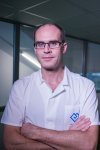 | Doc. MUDr. Vladimir Benes, Ph.D. head of the clinic | 22443 2501 | vladimir.benes@fnmotol.cz |
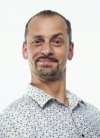 | prof. MD RNDr. Ondřej Bradáč, Ph.D. deputy principal | 22443 2504 | ondrej.bradac2@fnmotol.cz |
BSc.Tereza Drbohlavová | 22443 2505 | tereza.drbohlavova2@fnmotol.cz |
Secretariat part for children
| Petra Zajíčková | 22443 2501, fax. 2520 | petra.zajickova@fnmotol.cz |
Secretariat part for adults
| Tereza Šetinová | 22443 2504, fax. 2521 | tereza.setinova@fnmotol.cz |
Economic manager of the clinic
| Bc. Michaela Dittrich | 22443 2545 | michaela.dittrichova@fnmotol.cz |
Doctors
Doctors specialists
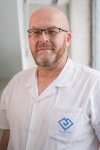 | MUDr. Martin Blaha, Ph.D. | 22443 2555 | martin.blaha@fnmotol.cz |
 | MD Miloslav Holub | 22443 2603 | miloslav.holub@fnmotol.cz |
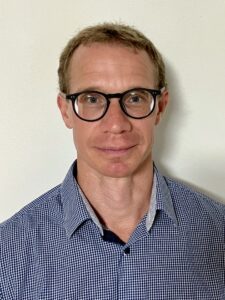 | MD Ondřej Chudomel | 22443 2532 | ondrej.chudomel@fnmotol.cz |
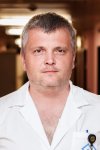 | MD Róbert Leško, Ph.D. | 22443 2511 | robert.lesko@fnmotol.cz |
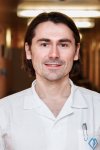 | Doc. MD Petr Libý, Ph.D. | 22443 2553 | petr.liby@fnmotol.cz |
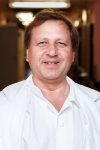 | MD Jiří Steindler | 22443 2525 | jiri.steindler@fnmotol.cz |
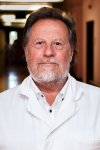 | Doc. MD Michal Tichý, CSc. | 22443 2553 | michal.tichy@fnmotol.cz |
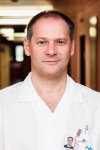 | MD Miroslav Vaculík | 22443 2550 | miroslav.vaculik@fnmotol.cz |
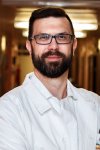 | MD Aleš Vlasák, Ph.D. | 22443 2555 | ales.vlasak@fnmotol.cz |
Doctors in training
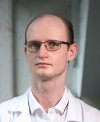 | MUDr. Vaclav Dlouhy | 22443 2525 | vaclav.dlouhy@fnmotol.cz |
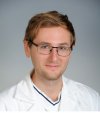 | MD Petr Skalický, Ph.D. | 22443 2558 | petr.skalicky@fnmotol.cz |
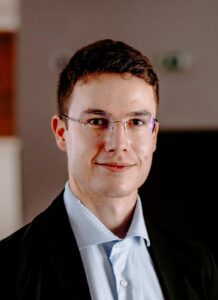 | MD Pavel Sova | 22443 2555 | pavel.sova@fnmotol.cz |
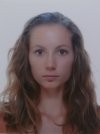 | MD Jana Táborská | 22443 2558 | jana.taborska@fnmotol.cz |
 | MD Jakub Táborský | 22443 2558 | jakub.taborsky@fnmotol.cz |
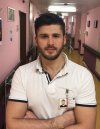 | MD Dmitry Tukmachev, Ph.D. | 22443 2511 | dmitry.tukmachev@fnmotol.cz |
Sisters
| Head nurse | Bc. Tereza Drbohlavová | 22443 2505 | tereza.drbohlavova2@fnmotol.cz |
Station nurse | Daniela Zachova | 22443 2506 | daniela.zachova@fnmotol.cz |
Station nurse | Lenka Hůšová | 22443 2507 | lenka.husova@fnmotol.cz |
District nurse | Peter Janků | 22443 2523 | petra.janku@fnmotol.cz |
District nurse | Martina Vamberská | 22443 2564 | martina.vamberska@fnmotol.cz |
District nurse | Katerina Slivková | 22443 2564 | katerina.slivkova@fnmotol.cz |
Professional ambulances
To order to the ambulance doc. MUDr. Vladimír Beneš, Ph.D. call 2 2443 2501.
Children's part:
Polyclinic, 3rd floor
Outpatient doctors
MD Jakub Táborský
MD Miloslav Holub
MD Miroslav Vaculík
Doc. MD Petr Libý, Ph.D.
MD Jana Táborská
Orders to the ambulance can be made by phone on Monday - Friday 7:00 - 8:00 12:00 - 14:00 on phone number 22443 2523 or 22443 2501.
Adult part:
Blue Building, 3rd floor, node A, (entrance Eye Complement)
Monday - Friday from 9,00 - 14,00 (after 14,00 only for acute patients on the 1st floor, node C)
Outpatient doctors
MUDr. Martin Blaha, Ph.D.
MUDr. Vaclav Dlouhy
MD Róbert Leško, Ph.D.
MD Petr Skalický, Ph.D.
MD Jiří Steindler
MD Jakub Táborský
MD Dmitry Tukmachev, Ph.D.
MD Aleš Vlasák, Ph.D.
Monday scheduled procedures in the procedure outpatient room (ground floor B – C)
Order to the ambulance by phone Monday - Friday from 7.30:10.00 - 13.00:14.00 a.m. and XNUMX - XNUMX on phone number 22443 2564 or 22443 2501, or by email at nchfnm@fnmotol.cz, with a telephone number.
Department for children
The children's part of the Neurosurgical Clinic is located in the children's monoblock, lower ground floor, node C (SP C). The capacity of standard beds is 14 and ICU beds 6.
Standard rooms are a maximum of 3 beds, with bathroom and barrier-free design. ICU rooms are 2-bed with the possibility of watching TV and DVD. A playroom (with TV and DVD) is available for children to use their free time, members of the Hospital Volunteer Center visit children, clown visits take place here; play musical instruments and sing walks Puppets in the hospital. If the child is able, the teacher comes to the schoolchildren and the companion takes care of the extracurricular activities.
Children can use their own laundry in the hospital and bring their favorite toy from home. Mobile phones, laptops and other electronic devices are only permitted at your own risk.
A refrigerator, a kitchenette with an electric kettle and a microwave are available to patients on the ward.
Department visits are daily from 8:00 to 20:00 (in the ICU only 2 people at the bed).
Escort
Accompaniment of children up to 6 years and ZTP, ZTTP - if the current capacity of the beds allows, it is possible to accommodate the department na sofa bed with the right to food (breastfeeding mothers have priority), the stay is covered by the insurance company.
In children in older than 6 years, in which the presence of a parent is necessary, the doctor sends a request for an escort to the department for assessment by the review doctor. If the reviewing doctor approves the escort's stay, the escort is accommodated in the ward with the right to food (breastfeeding mothers and escorts of children under 6 have priority). With the capacity of escorts occupied, the parents of the oldest children will be sent to the hostel for the necessary time per night - the right to food remains.
Children after operations lying in the ICU or ARO
When a child goes to the ICU, the accompanying person remains entitled to a bed with the possibility of being in the ICU indefinitely.
When it goes child on ARO, escorts are released and in case of interest it is possible to arrange a hostel. After returning to our department, escorts are accepted again.
Hostel
Parents of children over the age of 6, whose stay is not covered by health insurance, and the need for their presence is not approved by the medical examiner, can use the paid services of the Motol Hospital during their child's stay in the hospital. There is also the possibility of hotel accommodation - Motol Accommodation.
Admission of children to the ward
Please arrive at the department reception by 9:30 hours.
Admission to the operation
In order for the operation to be performed on time, your child needs to come to a completely healthy reception, without signs of an acute infectious disease (eg fever, runny nose, cough, diarrhea, rash). Menstruation is also an obstacle to performing the operation (or it is possible to adjust the cycle with suitable medication in agreement with a gynecologist)!
In case of the above complications, please contact our clinic to change the date.
Forms: Preoperative examination + Entry questionnaire
Bring:
- Complete pre-operative examination, performed by a pediatrician.
- Anamnesis, medication, physical examination
- Blood count + differential, urine + sediment
- Basic serum biochemistry (urea, creatinine, CB, CRP, ionogram, liver tests)
- Coagulation examination (APTT, Quick, INR)
- Laboratory results must not be older than 14 days!
- Comments on the child's ability to undergo surgery in CA (not older than 7 days).
- Event. results of other examinations or medical reports in children treated for other more serious diseases, or performed MR, CT or X-ray examinations.
- Identity cards (OP, passport), event. power of attorney, proof of the child's health insurance, health and vaccination card of the child, results of the examination requested by the attending physician (eg ECG, CT, MR, X-rays).
- List of medicines that your child takes regularly, diabetes card, cardiac card...
- Personal items (personal underwear, pajamas, home shoes, toiletries, towel, etc., one, max. Two favorite baby toys - clean).
- School supplies.
- Casual clothes, walking clothes.
Admission to CT or MRI under general anesthesia (CA))
In order for the examination to be carried out on schedule, your child needs to be admitted completely healthy, without signs of an acute infectious disease (eg fever, runny nose, cough, diarrhea, rash). In case of the above complications, please contact our clinic to change the date.
Bring:
- Pediatrician's statement on the child's ability to undergo examination in CA (not older than 7 days).
- Identity cards (OP, passport), rent. power of attorney, proof of the child's health insurance, health and vaccination card of the child, results of the examination requested by the attending physician (eg ECG, CT, MR, X-rays).
- List of medicines your child takes regularly, diabetic card, cardiac card,…
- Personal items (personal underwear, pajamas, home shoes, toiletries, towel, etc., one, max. Two favorite baby toys - clean).
- School supplies.
- Casual clothes, walking clothes.
Catering
Infant food is prepared under sterile conditions by dairy cuisine (which also guarantees the safety of a balanced diet), we have fruit snacks, vegetable and meat-vegetable dishes. Parents can bring their own food, but only in the original packaging from the manufacturer. If the parents want to prepare their own baby food, they sign a form for the nurses that they do so at their own risk and responsibility, and that the ward, or the Dairy Kitchen, is not responsible for any of the child's health problems.
If the child does not have dietary restrictions, he can choose from a menu of two types of food (the choice of food does not apply to patients on the day of admission). If visitors bring food prepared outside the patient's canteen (fast food and fast food stalls) to children, they are also at their own risk and responsibility, and the department is not responsible for any health problems.
the child's dietary restrictions will inform the staff.
Parking
Parents of hospitalized children:
Parking of vehicles of legal representatives (escorts) of hospitalized children is possible in the covered parking lot and inside the premises of the Motol University Hospital, anywhere in places that are intended for parking vehicles of visitors and patients.
The free parking application form will be issued and filled in by the attending physician for the legal representative.
At each departure from the hospital premises, the legal representative hands over the entrance card to the fee collector and proves himself / herself with a valid completed form. Based on this, he will not be charged a fee for entering the Motol University Hospital.
Department for adults
The inpatient ward for adult patients is located on the 1st floor of sector C of the blue monoblock of the Motol University Hospital (adult part of the hospital).
The ward is divided into a standard inpatient station with 18 beds and an intensive care unit (ICU) with 6 beds.
The individual rooms of the standard bed station are designed for a maximum of 3 patients, and are structurally designed so that every two adjoining rooms have 2 washbasins, a toilet and a shower in the connecting corridor. A color TV is available in each room.
The department has one superior room (price 1 CZK/day).
ICU beds are under the constant supervision of nurses and are monitored by a camera system.
We recommend visits to the ward and ICU in the afternoon or by appointment with the attending physician.
Admission to the department
Arrive at the department by 9:30 to be accepted.
Admission to the operation
In order for the operation to be performed on schedule, you should not show signs of acute infectious disease (eg fever, runny nose, cough, diarrhea, rash ...). In case of the above complications, please contact our clinic to change the date.
Bring:
- Complete preoperative examination. Performed by a district doctor in cooperation with an internist and an event. other specialists (details to download here):
- Anamnesis, medication, physical examination
- Blood count + differential, urine + sediment
- Basic serum biochemistry (urea, creatinine, CB, CRP, ionogram, liver tests)
- Coagulation examination (APTT, Quick, INR)
- ECG and its description
- X-ray of the heart - lungs and its description
- Laboratory results must not be older than 14 days!
- Comments on the ability to undergo surgery in the CA (not older than 7 days).
- Event. results of other examinations or medical reports of other specialists (diabetic, cardiologist…)
- Identity cards (OP, passport), event. power of attorney, proof of health insurance.
- List of medicines you take regularly, diabetic card, cardiac card, ...
- Personal items (personal underwear, pajamas, home shoes, toiletries, towel, etc.).
Forms:
Preoperative examination
Recommendation for hospitalization
Administrative questionnaire
Operating rooms
The Department of Neurosurgery has two operating rooms that are equipped with modern technology enabling even the most demanding procedures: operating microscopes, exoscope, endoscope, navigation, ultrasound tumor tissue aspirator, neuromonitoring, X-ray amplifiers. neuroanesthesia.
Clinic program
- Surgery of glial tumors and brain metastases - here we use advanced methods of perioperative navigation and monitoring of nerve functions, including conscious operations and perioperative fluorescence. Of course, there is close cooperation with the Department of Oncology and the Institute of Pathology and Molecular Medicine and long-term dispensary care of patients.
- Non-malignant tumor surgery - in particular meningiomas, cranial base tumors, ventricular system, spinal cord and its sheaths and tumors affecting the neurocranium.
- Vascular neurosurgery - surgical management of cavernous, aneurysms, arteriovenous malformations, revascularization operations.
- Epileptosurgery - in cooperation with the Department of Pediatric Neurology and the Department of Neurology, we provide comprehensive neurosurgical care in the diagnosis and treatment of the entire spectrum of epileptology
- Hydrocephalus - endoscopic solutions or short-circuit operations
- Spinal surgery - surgical treatment of degenerative diseases of the spine (disc herniations, basic spondylosurgery, mini-invasive spinal surgery).
- Peripheral nerve surgery - treatment of narrowing syndromes, treatment of injuries and tumors of peripheral nerves.
- Craniocerebral trauma, brain and skull bones - observation of the injured person not requiring surgical treatment; surgical procedures addressing injuries and its short- and long-term consequences
- Craniostenosis - open or endoscopic complex solution and long-term monitoring of the entire spectrum of congenital malformations of the skull
- Spinal dysraphisms - surgical solution of congenital imperfect neural tube closure; long-term care for patients up to adulthood
- Treatment of spasticity - especially implantation of baclofen pump
Surgery of glial tumors and brain metastases
Onconeurosurgery is a subfield of neurosurgery that deals with the diagnosis and complex treatment of primary brain tumors - gliomas, as well as those secondary - brain metastasis.
Magnetic resonance glioblastoma Metastasis on magnetic resonance imaging
We implement the entire diagnostic and therapeutic process of pediatric and adult patients within onconeurosurgical program Motol University Hospital, based on the cooperation of a multidisciplinary team, which includes, in addition to neurosurgeons, mainly neurologists, neurooncologists and neuropathologists.
Every patient with a newly diagnosed tumor site in the brain and spinal cord belongs to the onconeurosurgery program. The University Hospital in Motol has advanced neuroimaging and electrophysiological methods that allow the correct diagnosis to be made, as well as comprehensive therapeutic options (neurosurgery, radiotherapy, chemotherapy, supportive therapy), which can ensure adequate treatment.
Why brain tumors arise
The exact cause of primary brain tumors is unknown. However, there are several factors that increase the likelihood of their occurrence. They are, in particular:
- Age - The risk of glioma increases with age. They most often appear around the age of 65. But they can arise at any age. Some tumors in this group are typical of childhood. These are ependymomas and pilocytic astrocytomas.
- Radiation - Exposure to ionizing radiation during therapeutic irradiation of other tumors or during nuclear explosions carries an increased risk of brain tumors. This has not been observed with electromagnetic or high frequency radiation generated in commonly used appliances.
- Family history - The occurrence of glioma in the family doubles the probability of its occurrence.
Brain metastases (secondary brain tumors) arise from the spread of cancer cells through the blood or lymphatic system (metastasized) from the original tumor (primary site) to the brain.
What are the types of gliomas and brain metastases and why is it important to distinguish between the different types?
Gliomas are tumors arising from the supporting glial cells of the brain. These cells are located around the nerve cells that help them function. Gliomas are formed in the brain and spinal cord. The three basic types of glial cells that give rise to tumors are astrocytes, oligodendrocytes and ependymal cells. The distribution of gliomas is based on the type of cell from which they originate, as well as on their genetic characteristics. This allows us to predict how the tumor will behave and what treatment will work on it.
- Astrocytes (cells with metabolic, protection and repair function) - these cells give rise to astrocytoma, anaplastic astrocytoma and glioblastoma (glioblastoma multiforme). A special group consists of pediatric pilocytic astrocytoma of the cerebellum, trunk and optic nerve.
- Oligodendrocytes (cells forming the envelopes of nerve processes) - these cells give rise to oligodendroglioma and anaplastic oligodendroglioma.
- Ependymal cells (cells that line the ventricles and spinal canal) - these cells give rise to ependymoma and anaplastic ependymoma (brain and spinal cord tumors in children), myxopapillary ependymoma (spinal cord tumor) and subependymoma.
Gliomas are the most common primary brain tumor. The type of tumor itself determines the treatment and prognosis. Treatment options are generally surgery, radiation therapy and chemotherapy.
Brain metastases occur when tumor cells spread from the original site of the tumor process to the brain. Any cancer can spread to the brain in this way. The most common are cancers of the lungs, breast, colon, kidneys and malignant melanoma of the skin. Brain metastases gradually increase, creating pressure and changing the function of the surrounding brain tissue. Determining the correct diagnosis (what the primary tumor is, how it responds to treatment, how the process is widespread) is an important prerequisite for optimal treatment.
How gliomas and metastases manifest
The manifestations of brain tumors vary according to the type of tumor, its size, location and growth rate. The most common are:
- General symptoms
- Symptoms of increased intracranial pressure - headache, feeling sick and vomiting, blurred vision
- Disorder of brain functions - memory disorders, personality changes, mood disorders, confusion
- Loss of self-sufficiency, ability to work
- Bearing symptoms
- Seizures
- Neurological deficit - limb weakness, speech disorders, sensation, senses (sight, smell, hearing), balance problems
- Combined symptoms
How is brain cancer examined?
A set of the following examinations is used to determine the correct diagnosis and thus treatment:
- Clinical examination - During the examination, the problems and symptoms of the brain tumor are evaluated. This allows us to get an idea of the location and extent of the tumor process and its manifestations.
- Imaging examination: These methods are used to identify the causes of the disorder and to determine the location, size, nature of the tumor and its relationship to critical brain structures. They are also a necessary aid in planning the surgical solution and subsequent therapy.
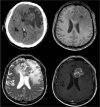 Computed tomography (CT) is a basic examination used in acute practice, which aims to determine the root cause of the problem - ischemia, bleeding, tumor or infection.
Computed tomography (CT) is a basic examination used in acute practice, which aims to determine the root cause of the problem - ischemia, bleeding, tumor or infection.- Magnetic resonance imaging (MRI) is a method of choice that allows us to identify the pathological lesion - the tumor, its character, boundaries and relationship to critical brain areas. The navigation sequence allows you to plan the surgical solution in the "shortest" way or orientation during the operation in complex anatomical conditions.
 MR spectroscopy (MRS) a ASL are magnetic resonance methods that allow us to determine the nature (whether it is more of a tumor process) and its nature (benign or malignant). However, the final word is always histology.
MR spectroscopy (MRS) a ASL are magnetic resonance methods that allow us to determine the nature (whether it is more of a tumor process) and its nature (benign or malignant). However, the final word is always histology. Functional MRI (fMRI) and brain imaging (DTI) they allow us to identify and locate brain centers and pathways while performing various simple tasks (limb movement, reading, listening) when performing MRI. This is essential information when planning surgery, and these centers must be avoided by the surgeon.
Functional MRI (fMRI) and brain imaging (DTI) they allow us to identify and locate brain centers and pathways while performing various simple tasks (limb movement, reading, listening) when performing MRI. This is essential information when planning surgery, and these centers must be avoided by the surgeon.- Positron emission tomography (PET) is a specialized imaging examination that senses the metabolic activity of the brain as well as the whole body. It is able to show the part of the brain that is disrupted by the tumor process, but also its activity. It is mainly used in postoperative monitoring to assess changes in process activity.
- Tumor tissue sampling for tumor type examination. To determine the optimal treatment, it is essential to have accurate information about the type of tumor and its genetic characteristics. Tumor sampling can be performed from a small approach with a thin needle by precise targeting through neuronavigation or during the operation itself. The sample taken is then analyzed in the laboratory.
What are the treatment options for gliomas and brain metastases?
The treatment of brain gliomas and brain metastases is a comprehensive treatment based on the cooperation of a number of collaborating disciplines - neurosurgery, neurology, oncology and neuropathology. We take into account the type of tumor, the extent of the disability, the associated diseases and the overall condition of the patient. The proposed treatment is so-called "tailor-made" after taking into account all the above aspects in an effort to achieve the optimal (best possible) result.
 Tracking - ie monitoring of the development of the clinical condition and neuroimaging at regular intervals is primarily intended for only a very small subgroup of patients (low-grade gliomas). The procedure changes with the appearance of clinical symptoms or development on magnetic resonance imaging or PET examination.
Tracking - ie monitoring of the development of the clinical condition and neuroimaging at regular intervals is primarily intended for only a very small subgroup of patients (low-grade gliomas). The procedure changes with the appearance of clinical symptoms or development on magnetic resonance imaging or PET examination. - Neurosurgical removal of the tumor. The range of performance is determined by the type of tumor. In brain glioma operations, the goal is to remove the maximum part of the tumor without causing significant postoperative involvement. Gliomas also grow into healthy tissue and often into critical brain areas. On the other hand, "only" the removal of a significant part of the tumor leads to alleviation or disappearance of symptoms and positively affects the prognosis of patients. In brain metastasis operations, the goal is to remove the entire metastasis, resp. all metastases present.
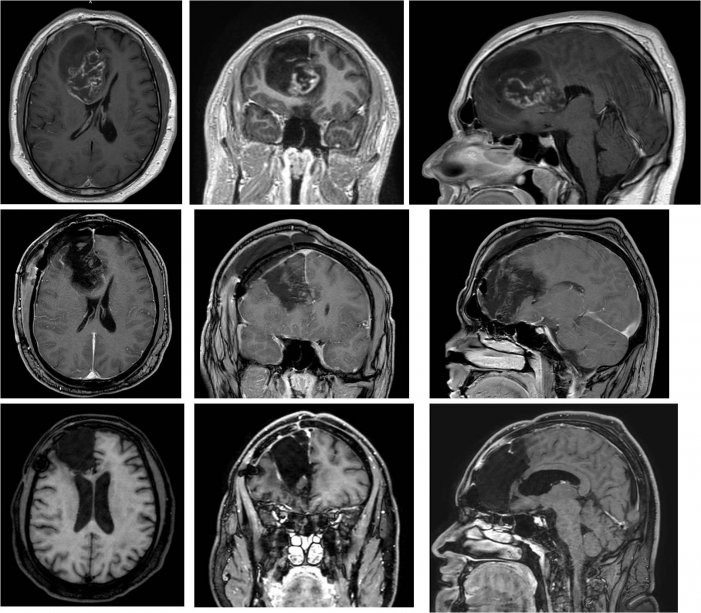
Glioblastoma before surgery, (top row), immediately after radical surgery (middle row) and after six months of follow-up (bottom row).
In order to achieve the optimal range of performance, the preservation of functionally important areas (such as centers and pathways for momentum, speech, sensory functions, etc.) is used at the Department of Neurosurgery, 2nd Medical Faculty, Charles University and FNM:
- Visualization using an operating microscope, exoscope or endoscope.
- Neuronavigation - the operating plan (range of operating power, display of some functional structures) is drawn in magnetic resonance images and is entered into the neuronavigation device. During the operation, the neuronavigation device allows you to use a special "pointer" to directly display in this navigation plan any place in the brain to which the surgeon points.
- Intraoperative ultrasonography - Ultrasound imaging provides information on the extent of the procedure as well as the anatomical conditions during the procedure.
- Intraoperative fluorescence - Imaging of certain parts of the tumor in an operating microscope or exoscope is possible after preoperative application of a special substance.
- Iintraoperative monitoring of brain functions is a set of methods that allow us to locate and monitor brain centers and pathways during surgery in an effort to minimize postoperative neurological deficit.
- Awake craniotomy (conscious surgery) is the only way we can monitor speech functions perioperatively. During the operation, the patient is painlessly aroused and tested for speech function in order to accurately locate and protect them during the operation. Subsequently, the performance continues as standard with re-sleep.
Surgery following cancer treatment usually includes the following treatment modalities:
- Chemotherapy. Chemotherapeutics are drugs used in the form of tablets or infusions that aim to destroy the remaining tumor cells. Unfortunately, in addition to cancer cells, they also affect healthy cells and the penetration of these substances into the brain and spinal cord is very difficult. It is most often used in combination with other treatments.
- Radiation therapy - conventional radiotherapy and targeted radioneurosurgery (Lexell's gamma knife, proton therapy). Radiation therapy uses high energy in the form of radiation to destroy tumor cells. It is used mainly postoperatively, for the treatment of inaccessible and multiple foci and in high-risk patients. It is used in combination with other treatments.
- Supportive (palliative) care. Palliative care is specialized medical care aimed at providing relief from pain and other symptoms of a serious illness. It is intended for patients with advanced stages of cancer.
Specifics of glial tumors in childhood
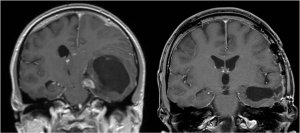 The most common tumors in childhood can be benign, so-called low-stomach glial tumors, e.g. pilocytic astrocytomas. Low-grade gliomas in childhood behave differently than in adults, mainly because they do not usually progress to higher grades and malignancies. It is therefore necessary to take a highly gentle approach to them and perform examinations, including surgical solutions, at a competent workplace with the background of modern comprehensive pediatric medicine.
The most common tumors in childhood can be benign, so-called low-stomach glial tumors, e.g. pilocytic astrocytomas. Low-grade gliomas in childhood behave differently than in adults, mainly because they do not usually progress to higher grades and malignancies. It is therefore necessary to take a highly gentle approach to them and perform examinations, including surgical solutions, at a competent workplace with the background of modern comprehensive pediatric medicine.
We remove operable tumors in childhood using modern approaches such as navigation, nerve tract tracing, perioperative electrophysiological monitoring and intraoperative ultrasound and neuroendoscopy.
We treat patients with inoperable so-called low-grade, slow-growing tumors with special care. Here we perform gentle minimally invasive procedures, mostly endoscopic biopsies. The advantages of this approach are a small surgical burden, rapid recovery and obtaining the necessary information about the tumor process for further treatment. We work closely with pediatric neurooncologists. Modern histopathological diagnostics, which takes place within our hospital or in cooperation with European (Heidelberg) or world centers (Toronto), is essential. With this approach, we have the opportunity to provide the world's most modern treatment, for example, by including patients in large international studies.
What are the results of glioma and brain metastasis treatment?
Treatment outcomes depend on the type and extent of the tumor, its relationship to critical brain structures, as well as associated diseases and the patient's general condition. In addition, in brain metastases from the stage of the primary tumor process. The actual results of the treatment are then given by the possible safe range of neurosurgical performance and the tumor's response to radiation treatment and chemotherapy.
What are the risks of oncoonosurgery?
Each area of the brain has a specific function. Therefore, the risks vary depending on the site of surgery and the type of surgery. Through a complex diagnostic process and a targeted strategy of the performance itself, we try to minimize the risk of any neurological deficit.
Non-malignant tumor surgery
Benign brain tumors do not destroy the brain tissue as such, but the clinical symptoms they cause are caused by pressure on the brain parenchyma or the waterways. The therapy of these tumors is mostly surgical. Our goal is maximum radical performance while maintaining full neurological function. A detailed preoperative examination using MRI, CT or angiography helps us to do this. During our own performance, electrophysiological monitoring, control using MRI navigation and modern mini-invasive methods of work are completely common at our workplace today. Each pathology also requires a specific individual approach, which is repeatedly discussed within our team and in multidisciplinary seminars.
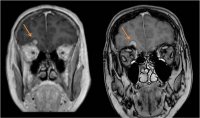 Meningeeomas are tumors that grow from the sheaths of the brain. The vast majority are benign, very slow-growing, and mainly affect elderly patients and more often women. They represent about 15-20% of all brain tumors. Due to the slow growth, most patients come with a large tumor, which is manifested by pressure on the brain tissue with variable clinical symptoms according to the location. It is not uncommon for an asymptomatic tumor to be detected during an investigation due to unrelated problems. In smaller asymptomatic tumors, the patient can only be monitored by routine MRI checks.
Meningeeomas are tumors that grow from the sheaths of the brain. The vast majority are benign, very slow-growing, and mainly affect elderly patients and more often women. They represent about 15-20% of all brain tumors. Due to the slow growth, most patients come with a large tumor, which is manifested by pressure on the brain tissue with variable clinical symptoms according to the location. It is not uncommon for an asymptomatic tumor to be detected during an investigation due to unrelated problems. In smaller asymptomatic tumors, the patient can only be monitored by routine MRI checks.
For larger and symptomatic tumors, a surgical solution is needed. The goal of the procedure is radical resection, including infiltrated dura mater, whenever technically possible. If full radicality cannot be achieved due to the location of the tumor, a small residue can be monitored or irradiated with Leksell's gamma.
An ependymoma is a tumor that grows from the lining of the ventricles. In children's age, it is one of the most common tumors and its occurrence is mainly intracranial, in adult patients it is rarer with a more frequent occurrence in the spinal canal. Histologically, this is a relatively diverse group with the formation of implantation metastases at higher stages. The treatment of these tumors is surgical, where the radicality of the procedure is a significant prognostic factor.
age, it is one of the most common tumors and its occurrence is mainly intracranial, in adult patients it is rarer with a more frequent occurrence in the spinal canal. Histologically, this is a relatively diverse group with the formation of implantation metastases at higher stages. The treatment of these tumors is surgical, where the radicality of the procedure is a significant prognostic factor.
It is a benign tumor with a typical occurrence in the cerebellum. It mainly affects younger patients and is often part of a complex genetic syndrome. Clinically, the pressure in the posterior cranial fossa is manifested by cerebellar syndrome and the development of intracranial hypertension. This type of tumor is always an indication for surgery.
Vestibular schwannoma is a more rare, intracranial benign neoplasm with an incidence of approximately 10 patients per million population. It is typically a slow-growing tumor, the most common symptoms of which are hearing and balance disorders. With further growth, pressure on the facial nerve can lead to impaired facial muscle movement and in really large tumors with pressure on the brainstem and ventricles, as well as other more serious neurological symptoms. Due to the slow growth, a large part of these tumors can only be monitored by regular MRI checks, and when we grow, we then approach the surgical solution. We perform these procedures in cooperation with the Department of ENT and Head and Neck Surgery, 1st Medical Faculty, Charles University. Electrophysiological control of cranial nerve function during surgery is a matter of course.
Childhood brain tumors can often be benign and completely eradicated. They may be manifested by intracranial hypertension, hydrocephalus, neurological findings, epileptic seizures, visual impairment or hormonal imbalance. Well-removed tumors include some types of plexus papillomas growing from vascular structures inside the ventricles. Dysembryoplastic neuroepithelial tumors (DNET) usually present with epilepsy. Removal also addresses epilepsy. Some types of tumors can be removed with a gentle approach outside the nervous tissue, such as meningiomas and some pineal tumors. Other types of benign tumors, on the other hand, may be anatomically misplaced, such as craniopharyngiomas or slow-growing tumors growing out of the visual tract. Where it is not possible to remove the tumor safely, we take a minimally invasive (stereotactic needle or guided endoscopic) biopsy, on the basis of which it is decided on further treatment.
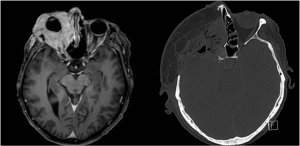 The part of the skull on which the brain "lies" and which separates the cranial cavity from the facial part of the skull is called the cranial base. Surgery in this area logically combines the fields it affects - neurosurgery, ENT, ophthalmology, dentistry, but also plastic surgery and interventional radiology. Complex anatomical conditions and a diverse range of pathologies cannot do without this interdisciplinary cooperation. The operational procedures performed here are characterized by extensive preoperative planning of the mentioned specialties. The goal of this cooperation is a "tailor-made" performance, which aims at the most radical operation, the minimum risk of complications and an adequate cosmetic result. The University Hospital in Motol, with its complexity and connection to other specialties, makes it possible to solve this difficult issue through multidisciplinary cooperation. Colleagues from the Department of ENT and Head and Neck Surgery of the 1st Medical Faculty of Charles University and the Dental Clinic of Children and Adults of the 2nd Medical Faculty of Charles University are a regular part of the operating team in these cases. The resection procedure, the main goal of which is not to injure vital nerve and vascular structures in anatomically difficult areas (such as the cavernous canal or rock bone), is in some cases followed by a reconstruction procedure, when it is necessary to address a larger soft tissue defect. We perform the reconstruction part of the operation in cooperation with plastic surgeons from the Surgical Clinic of the 2nd Medical Faculty of Charles University.
The part of the skull on which the brain "lies" and which separates the cranial cavity from the facial part of the skull is called the cranial base. Surgery in this area logically combines the fields it affects - neurosurgery, ENT, ophthalmology, dentistry, but also plastic surgery and interventional radiology. Complex anatomical conditions and a diverse range of pathologies cannot do without this interdisciplinary cooperation. The operational procedures performed here are characterized by extensive preoperative planning of the mentioned specialties. The goal of this cooperation is a "tailor-made" performance, which aims at the most radical operation, the minimum risk of complications and an adequate cosmetic result. The University Hospital in Motol, with its complexity and connection to other specialties, makes it possible to solve this difficult issue through multidisciplinary cooperation. Colleagues from the Department of ENT and Head and Neck Surgery of the 1st Medical Faculty of Charles University and the Dental Clinic of Children and Adults of the 2nd Medical Faculty of Charles University are a regular part of the operating team in these cases. The resection procedure, the main goal of which is not to injure vital nerve and vascular structures in anatomically difficult areas (such as the cavernous canal or rock bone), is in some cases followed by a reconstruction procedure, when it is necessary to address a larger soft tissue defect. We perform the reconstruction part of the operation in cooperation with plastic surgeons from the Surgical Clinic of the 2nd Medical Faculty of Charles University.
Tumors inside the spinal canal are less common and in most cases benign. However, they are dangerous due to their growth and pressure on the spinal cord and spinal roots. Our approach to these tumors is therefore very active and patients are indicated for early surgical treatment. The type of these tumors is similar to intracranial, so they are most often meningiomas or ependymomas, in the area of nerve roots then schwannomas or neurofibromas. They are clinically manifested by pain, impaired mobility and sensitivity of the limbs, or incontinence of urine or stool.
Vascular neurosurgery
Vascular neurosurgery (also cerebrovascular) is a specialized area of the field dealing with the diagnosis and complex treatment of cerebrovascular diseases. These lesions are benign, ie after resolving them, the patient is cured and only monitored for a long time. This issue cannot be done without close interdisciplinary cooperation, especially with radiologists (both in the field of diagnostics and in the treatment itself), neurologists, but also with radiosurgeons (Lexell's gamma knife). When dealing with all vascular diseases, we must always carefully weigh the natural course of the disease (ie what is the risk for the patient resulting from the diagnosis at a given moment and for the rest of life) and contrast the risk of our proposed therapy. We assess each patient across disciplines and the resulting treatment plan is therefore individually tailored to the risks mentioned. The understandable goal is their minimization and maximum effort to solve the disease. Vascular neurosurgery mainly addresses the following diseases.
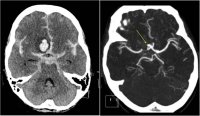 Subarachnoid hemorrhage (SAK) is a serious condition in which there is bleeding into the wet spaces at the base of the brain. The most common cause is the so-called cerebral aneurysm. Under this name lies the acquired disease of the vascular wall of the cerebral artery, which can be imagined as its blind spot. It is most often found on the arteries running just below the base of the brain. It threatens its wearer mainly by rupture, when a stream of blood spills along the brain or literally crushes the adjacent brain tissue. Patients perceive this bleeding as a sudden, acute, as yet unknown, headache, and is often accompanied by loss of consciousness or impaired mobility. Transport to the hospital is usually followed by CT scans and CT angiographs, which show the condition of the brain after the event and its cause. Unfortunately, the consequences of bleeding are in many cases severe and permanent. The treatment following such an event aims to eliminate the bleeding bulge from the circulation, thus preventing repeated bleeding (it has an even worse prognosis) and to enable the use of modern intensive care. Thus, the second part of treatment only begins with the elimination of the aneurysm from the circulation. The patient is endangered for about 2 weeks by the development of so-called vasospasm (contraction of the cerebral arteries), which can eventually lead to the development of cerebral ischemia. Intensive therapy focuses on preventing the development of this condition. Another accompanying phenomenon of SAK may be development hydrocephalus, which often requires a short-circuit operation. In addition to these two most feared conditions, you can also encounter a number of internal or neurological complications (eg epilepsy).
Subarachnoid hemorrhage (SAK) is a serious condition in which there is bleeding into the wet spaces at the base of the brain. The most common cause is the so-called cerebral aneurysm. Under this name lies the acquired disease of the vascular wall of the cerebral artery, which can be imagined as its blind spot. It is most often found on the arteries running just below the base of the brain. It threatens its wearer mainly by rupture, when a stream of blood spills along the brain or literally crushes the adjacent brain tissue. Patients perceive this bleeding as a sudden, acute, as yet unknown, headache, and is often accompanied by loss of consciousness or impaired mobility. Transport to the hospital is usually followed by CT scans and CT angiographs, which show the condition of the brain after the event and its cause. Unfortunately, the consequences of bleeding are in many cases severe and permanent. The treatment following such an event aims to eliminate the bleeding bulge from the circulation, thus preventing repeated bleeding (it has an even worse prognosis) and to enable the use of modern intensive care. Thus, the second part of treatment only begins with the elimination of the aneurysm from the circulation. The patient is endangered for about 2 weeks by the development of so-called vasospasm (contraction of the cerebral arteries), which can eventually lead to the development of cerebral ischemia. Intensive therapy focuses on preventing the development of this condition. Another accompanying phenomenon of SAK may be development hydrocephalus, which often requires a short-circuit operation. In addition to these two most feared conditions, you can also encounter a number of internal or neurological complications (eg epilepsy).
Thus, the preventive treatment, which prevents the rupture from rupturing itself, is attractive. With the expansion of diagnostic options (CT and MRI) to the level of district hospitals, in recent years we have encountered an accidental finding of an aneurysm; as a side effect of an examination performed for unrelated difficulties (eg minor injury, common headache or dizziness). In these cases, we must very carefully consider the risks of rupture of the bulge; The main risk factors include size, location or high blood pressure. In contrast to the risk of rupture, there are complications of possible performance, taking into account not only the aneurysm, but also the overall condition of the patient.
The aneurysm closure itself can be achieved in two ways: surgical - by loading the clamp through the inlet to the bulge; and endovascularly - the radiologist uses special thin tubes to penetrate the arterial flow directly into the bulge and fills it with special spirals. The decision as to which solution is appropriate for a particular bulge and patient will result from an interdisciplinary discussion that takes into account not only the factors mentioned above. After the aneurysm is removed from the circulation, the patient is monitored for a long time using CT or MR angiography - the aim is to detect a possible recurrence in the original area or a newly formed bulge in another place in the cerebral circulation.
Arteriovenous malformation (AVM) is a network of pathological dilated vessels in which blood flows directly from the arterial part of the flow to the vein, so the normally present capillary flow is missing. The blood vessels are therefore exposed to high blood flow and pressure and are at risk of rupturing with subsequent cerebral hemorrhage. In addition, AVM may present with an epileptic seizure or stroke-like symptoms; AVM "robs" the adjacent brain tissue of blood and oxygen, which can cause both symptoms of ischemia and epileptic seizures. AVM can also be accidentally detected during an examination for unrelated problems.
Treatment options are:
- Conservative treatment - only observations and regimens (control of high blood pressure, no smoking), indicated in asymptomatic patients (or if the patient does not want a solution) or, conversely, in intractable or high-risk AVM
- Surgical removal - widely used in small and easily accessible AVM; the surgeon separates the entire AVM from the surrounding brain tissue, gradually eliminating the supply arteries and, after their treatment, the drainage veins
- Endovascular treatment - the radiologist fills either the entire AVM or only part of it with a special glue and thus prevents further blood flow; rarely effective as a stand-alone treatment, it is usually used in combination with surgery, when hard-to-access arteries are treated
- Gamma knife treatment - targeted AVM irradiation, which leads to its obliteration over the next 3 years or so
- A combination of the above
Unlike AVM, where blood flows under high pressure, cavernomas are low-flow vascular lesions. They can also be imagined as continuous cavities (similar to raspberries) filled with blood. The weakened blood vessel wall of these balls can rupture and cause cerebral hemorrhage. Another manifestation is an epileptic seizure. The treatment is currently only surgical, using modern methods: navigation, which will allow targeted access; perioperative monitoring alerts the surgeon to the presence of important centers and nerve pathways.
Acute, wheezing and paroxysmal pain, often caused by a certain trigger mechanism, is called neuralgia. It most commonly occurs in the facial area and is typically localized to the innervation area of the trigeminal nerve. One of its causes may be the so-called neurovascular conflict. It is an irritation of the trigeminal nerve after exiting the brainstem around an ongoing vessel (usually one of the cerebral arteries). If drug treatment is not effective (or is not tolerated by the patient), a surgical solution is in place. During the small approach operation, the surgeon gently moves the blood vessel crossing the cruciate nerve, inserts a piece of Teflon between them and fixes everything in a new position with tissue glue. The operation is performed under general anesthesia, monitoring the functions of the cranial nerves, especially the facial nerves. A high percentage (approximately 80%) of patients report pain relief.
The branching of the carotid artery is an area where so-called atherosclerotic plaques often form, which narrow the lumen of the artery and change the nature of the blood flow, which can lead to the formation of blood clots. When they are released and embolized into the cerebral arteries, they close, causing a stroke. Early diagnosis of stroke and immediate transport to a specialized center allows rapid deployment of treatment, which in many cases dissolves the occlusion in the cerebral circulation. Subsequently, the "dilution" of the blood is continued; we try to prevent the recurrence of the incident. However, if the narrowing of the carotid artery reaches a certain degree (60%), treatment is necessary to eliminate the cause of the stroke. If the narrowing is detected accidentally (eg by listening to a district doctor for a preventive examination), treatment is indicated for stenosis of more than 80%.
There are two types of treatment available today:
 Endovascular - the radiologist with the help of special catheters penetrates the arterial bed into the place of narrowing, then it "expands" and the lumen of the artery is renewed by a special tube, the so-called stent
Endovascular - the radiologist with the help of special catheters penetrates the arterial bed into the place of narrowing, then it "expands" and the lumen of the artery is renewed by a special tube, the so-called stent- Surgical - branching of the artery is dissected at the neck, then all arteries are closed with clamps and after incision the atheroplate is removed. The vessel is then sutured, the clamps removed and flow restored. The operation is performed either under general anesthesia with monitoring of brain functions, or under local anesthesia; brain functions are monitored directly by communicating with the patient and monitoring limb motility.
Both techniques have their advantages and disadvantages, in general we can say that we prefer a surgical solution for younger patients with calcified plaque, on the contrary, the endovascular approach is more advantageous for internally at-risk patients with soft plaque or anatomically difficult to access carotid bifurcation.
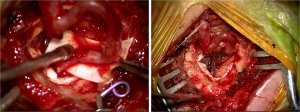 If the narrowing of the carotid artery continues, it may close completely. The moment of closure itself may not manifest itself at all, but it usually takes place under the image of a more or less serious stroke. If the blood vessel is not soon recanalized, the occlusion becomes chronic and the brain is further supplied with blood by other arteries. Insufficient blood supply in a closed artery basin sometimes manifests as a minor, but recurrent, stroke; Alternatively, this deficiency can be detected by a specialized SPECT or PET examination. In this case, it is then appropriate to support the blood supply to the affected area of the brain. The so-called extra-intracranial anastomosis offers an elegant solution: the surgeon dissects the artery supplying the scalp and from a small craniotomy sutures it to the artery running on the surface of the brain.
If the narrowing of the carotid artery continues, it may close completely. The moment of closure itself may not manifest itself at all, but it usually takes place under the image of a more or less serious stroke. If the blood vessel is not soon recanalized, the occlusion becomes chronic and the brain is further supplied with blood by other arteries. Insufficient blood supply in a closed artery basin sometimes manifests as a minor, but recurrent, stroke; Alternatively, this deficiency can be detected by a specialized SPECT or PET examination. In this case, it is then appropriate to support the blood supply to the affected area of the brain. The so-called extra-intracranial anastomosis offers an elegant solution: the surgeon dissects the artery supplying the scalp and from a small craniotomy sutures it to the artery running on the surface of the brain.
In childhood, the most common of vascular pathologies are the so-called pial arteriovenous malformations (pAVM), ie the direct connection of arteries to veins via the so-called nidus of pathological vessels. The risk of these malformations is their rupture. We operate suitable types of pAVM using a microsurgical approach. Some types of pAVM need to be treated with an endovascular approach or irradiated with a gamma knife. We have all these options at our disposal.
In the area of rare vascular malformations such as Galen vein malformations and dural canal malformations, endovascular treatment is the method of choice, and in these malformations a modern approach is needed to address associated complications such as hydrocephalus, cardiac and neurological issues. Patients with this finding directly require a comprehensive solution using the facilities of the children's section of the hospital.
Epileptosurgery
Epileptosurgery is a set of surgical procedures that aim to eliminate or affect the function of one or more areas of the brain that are responsible for seizures.
Who is epileptosurgery for?
Epileptosurgery is performed on pediatric and adult patients in whom control of epileptic seizures is not achieved with conservative treatment. The primary treatment of epilepsy is regimen measures and anti-seizure drugs - antiepileptics. In case of their failure, ie after the determination of the so-called drug resistance (failure to achieve seizure control after the use of 2 antiepileptics), or in case of inadequate neuropsychological development in children, the patient undergoes a battery of preoperative examinations. Based on their results, we can then determine, on the one hand, whether it is possible to perform the operation and whether such an operation is safe for the patient.
Where and who performs epileptosurgery
We implement the entire diagnostic and therapeutic process of pediatric and adult drug-resistant patients within the epileptosurgery program Motol Epilepsy Centers, based on the cooperation of a multidisciplinary team Prague Epileptosurgery Groups (DOG). In addition to neurosurgeons, it includes mainly neurologists, neuropsychologists, neuroradiologists and neuropathologists.
Objectives of epileptosurgery
The goal of the whole process is to cure epilepsy or significantly reduce the severity and frequency of seizures. Further improve neuropsychological development in children and the quality of life of patients. Drug-resistant epilepsy brings with it a number of health risks and social limitations, not only for the patient, but also for his family. For example, risks of injury, delays in neuropsychological development, depression, memory disorders, risks related to pregnancy and pregnancy or restrictions such as driving bans, etc.
Who should be sent to a comprehensive epileptosurgery center
According to the recommendations of the International League Against Epilepsy (ILAE), every patient with drug-resistant (drug-uncontrollable) epilepsy should be sent to the comprehensive Center for Epilepsy. Our Center for Epilepsy Motol has advanced neuroimaging and electrophysiological methods that enable successful treatment of epilepsy even in patients with severe epilepsy.
Who is a candidate for epileptosurgery and what can be expected
About a quarter of patients with epilepsy are drug-resistant patients, but only a part (approximately 25%) of them are candidates for procedures that can be expected to have postoperative seizures with possible discontinuation of anti-seizure drugs. It is very difficult to determine who is a suitable candidate for which procedure. No human being or patient is the same as anyone else. At our Center for Epilepsy, we perform procedures that are so-called "tailor-made" for each patient. Therefore, patients undergo a number of preoperative examinations, the aim of which is to reveal the location of seizures and its relationship to other areas of the brain, which will allow us to minimize the risk of postoperative neurological deficit. These methods can be divided into individual protocols: 1) basic, 2) advanced, 3) invasive and 4) perioperative. Some examinations can be performed on an outpatient basis, but some require a hospital stay.
INVESTIGATION PROTOCOLS
1) Basic investigation protocol
The following procedures are standard tests used to identify the source of epileptic activity:
- Electroencephalogram (EEG) is an examination that senses the electrical activity produced by the brain and is the basic examination in patients with epilepsy.
- Video EEG monitoring is a long - term EEG with video recording. The exact timing of the onset and nature of the seizure with changes in the EEG are very important in determining the location of the seizures.
- Magnetic resonance imaging (MRI) is a basic examination that aims to identify the pathological lesion (developmental disorders, tumor, vascular anomalies, etc.) that is responsible for seizures. There are focal sites that even MRI is not able to display at present, but in our Motol Epilepsy Center we can also detect and operate on such foci.
- Neuropsychological tests represent a set of techniques for measuring skills and memory. It is used to determine how epilepsy changes the functions of different parts of the brain.
2) Extended investigation protocol
If the results of the standard tests are not unambiguous, we use the following methods:
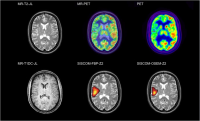 Positron emission tomography (PET) is a specialized imaging test that senses the metabolic activity of the brain. It is able to show the part of the brain that is disrupted by the epileptic lesion.
Positron emission tomography (PET) is a specialized imaging test that senses the metabolic activity of the brain. It is able to show the part of the brain that is disrupted by the epileptic lesion.- Single Photon Emission Computed Tomography (SPECT) is a specialized imaging examination measuring the uptake of a substance applied to a patient's vein immediately after the onset of an attack. Even this examination is able to show the part of the brain that is disturbed by the epileptic lesion.
To illuminate the relationship of the epileptic lesion to other brain functions (such as centers and pathways for momentum, speech, sensory functions, etc.) we use:
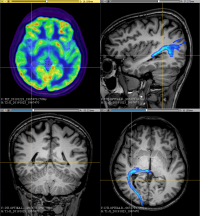 Functional MRI (fMRI) and brain imaging (DTI) they allow us to identify and locate brain centers and pathways while performing various simple tasks (limb movement, reading, listening) when performing MRI.
Functional MRI (fMRI) and brain imaging (DTI) they allow us to identify and locate brain centers and pathways while performing various simple tasks (limb movement, reading, listening) when performing MRI.- Wada test is used to test the patient 's speech and memory functions during andcerebrovascular diagnostics (imaging of blood vessels by inserting a tube through the artery in the groin into the carotid artery and injecting a contrast agent). During the examination, a short-acting substance is applied, which temporarily "sleeps" a part of the brain, while the neuropsychologist also tests speech and memory functions. For example, the test also confirms right-handedness or left-handedness, which is important information in which hemisphere the speech functions are located.
3) Invasive investigation protocol
In certain cases, in order to accurately determine the location of epilepsy and its relationship to brain function, the patient is indicated for invasive examination by intracranial EEG:
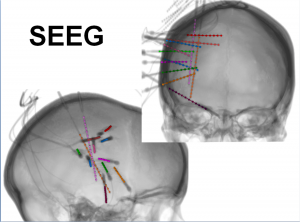 Introduction of intracranial deep electrodes and S-EEG. These electrodes are implanted during surgery in the neurosurgical room under general anesthesia using a stereotactic frame, which allows us high insertion accuracy. In this way, deep electrodes are introduced through the individual bores, the number of which is about 10 to 20. After waking up, the patient is subsequently recorded long-term (about 4-10 days) EEG activity and the nature of seizures using S-EEG (Stereo-EEG is similar to Video EEG monitoring ). We can electrically test brain functions through the inserted electrodes. If the location of the epilepsy can be located, it is possible to perform an operation through the introduced electrodes using the so-called RFTA (Radio Frequency Thermal Ablation, see below).
Introduction of intracranial deep electrodes and S-EEG. These electrodes are implanted during surgery in the neurosurgical room under general anesthesia using a stereotactic frame, which allows us high insertion accuracy. In this way, deep electrodes are introduced through the individual bores, the number of which is about 10 to 20. After waking up, the patient is subsequently recorded long-term (about 4-10 days) EEG activity and the nature of seizures using S-EEG (Stereo-EEG is similar to Video EEG monitoring ). We can electrically test brain functions through the inserted electrodes. If the location of the epilepsy can be located, it is possible to perform an operation through the introduced electrodes using the so-called RFTA (Radio Frequency Thermal Ablation, see below).- Introduction of intracranial surface electrodes is similar to deep electrode testing. The difference is that it is not made through individual bores, but the contacts are placed directly on the surface of the brain during the classic surgical opening of the skull. Monitoring is followed by the operation itself with the removal of the epileptic lesion.
4) Intraoperative protocol
The following methods are used to specify the location of the epileptic lesion as well as functionally important brain areas during the procedure itself:
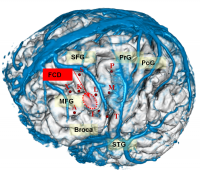 Neuronavigation - the operating plan (range of operating power, display of some functional structures) is drawn in magnetic resonance images and is entered into the neuronavigation device. During the operation, the neuronavigation device allows you to use a special "pointer" to directly display in this navigation plan any place in the brain to which the surgeon points.
Neuronavigation - the operating plan (range of operating power, display of some functional structures) is drawn in magnetic resonance images and is entered into the neuronavigation device. During the operation, the neuronavigation device allows you to use a special "pointer" to directly display in this navigation plan any place in the brain to which the surgeon points.- Electrocorticography (ECoG) is an EEG method that allows you to measure epileptic activity during surgery, verify and possibly change the range of performance itself.
- Intraoperative monitoring of brain functions is a set of methods that allow us to locate and monitor brain centers and pathways during surgery in an effort to minimize postoperative neurological deficit.
- Awake craniotomy is the only way we can monitor speech functions perioperatively. During the operation, the patient is awakened painlessly and his speech functions are tested in order to accurately locate and protect them during the operation. Subsequently, the performance continues as standard with re-sleep.
TYPES OF EPILEPTOCHURGICAL PERFORMANCE
The type of surgery depends largely on the location of the lesion from which the seizures originate and the patient's age. As highlighted above, at our Epilepsy Center, we perform procedures that are so-called "tailor-made" for each patient. Modifications of the following main types of operations currently dominate:
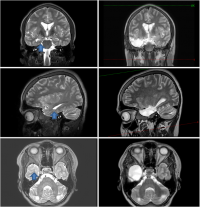 Epileptosurgical resection is the most common epileptosurgical procedure, the aim of which is to remove the part of the brain tissue that is responsible for seizures. It can be an anomaly occurring during the development of brain tissue, tumor, vascular malformations, etc. The aim of the procedure is to rid the patient of seizures and eventually to stop anti-seizure drugs.
Epileptosurgical resection is the most common epileptosurgical procedure, the aim of which is to remove the part of the brain tissue that is responsible for seizures. It can be an anomaly occurring during the development of brain tissue, tumor, vascular malformations, etc. The aim of the procedure is to rid the patient of seizures and eventually to stop anti-seizure drugs.- Functional hemisferectomy is an exercise performed on young children. Its goal is to break the connection of the hemisphere causing seizures with other parts of the nervous system. The goal is to achieve seizure-free and improve neuropsychological development.
- Vag stimulator (VNS) is a surgical procedure in which an electrode to the vagus nerve (n. vagus) in the neck area and a pulse generator to the subcutaneous tissue in the chest area are permanently surgically inserted into the patient. The impulses aim to disrupt the abnormal brain activity that causes seizures by reducing their frequency and severity.
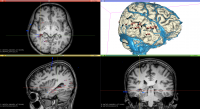 Deep brain stimulation (DBS) is a procedure in which an electrode is permanently inserted into a patient's brain and a pulse generator is inserted into the subcutaneous tissue in the chest area. The impulses aim to disrupt the abnormal brain activity that causes seizures by reducing their frequency and severity.
Deep brain stimulation (DBS) is a procedure in which an electrode is permanently inserted into a patient's brain and a pulse generator is inserted into the subcutaneous tissue in the chest area. The impulses aim to disrupt the abnormal brain activity that causes seizures by reducing their frequency and severity.
- Radio frequency thermal ablation (RFTA) is a less invasive surgical procedure in which a lesion of epilepsy is treated from already established deep brain electrodes and with the help of radio frequency current (usually only a part of the lesion can be affected in this way). It is a diagnostic procedure that can in some cases even treat and significantly affect seizures. This method was introduced at the Motol Epilepsy Center in 2017. By 2020, about 30 of these procedures had been performed. In the Czech Republic, our center has the most experience with this type of performance.
RESULTS OF EPILEPTO SURGERY OPERATIONS
The results of operations vary depending on the type of performance. In operations whose primary goal is the complete removal of the epilepsy (resection epileptosurgery), postoperative seizure disorder occurs in 70-80% of patients. If the patient is seizure-free for at least a year, gradual discontinuation of anti-seizure drugs may be initiated. However, this process is individual, depending on many factors. For operations in which a reduction in the frequency and severity of seizures (VNS, DBS) can be expected, a significant therapeutic effect is achieved with a reduction of 50 percent or more.
RISKS OF EPILEPTO SURGERY
Each area of the brain has a specific function. Therefore, the risks vary depending on the site of surgery and the type of surgery. Through a complex diagnostic process and a targeted strategy of the performance itself, we try to minimize the risk of any neurological deficit.
Hydrocephalus
Hydrocephalus is a term used to describe the excessive accumulation of cerebrospinal fluid in the ventricles. Excess fluid puts pressure on the brain tissue, and thus damage the brain with permanent consequences.
Function
Cerebrospinal fluid originates in the cerebral ventricles, flows through the wetland into the spinal canal and to the surface of the brain (the so-called subarachnoid space), where it is absorbed into the venous bed. The ventricles contain different amounts of fluid depending on age. The total amount is changed approximately 3 times a day.
Causes of hydrocephalus
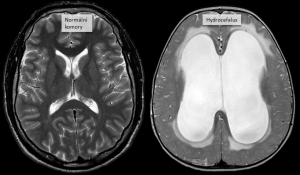 Hydrocephalus can be caused by one or more causes. It is traditionally divided into two types:
Hydrocephalus can be caused by one or more causes. It is traditionally divided into two types:
- Communicating hydrocephalus - caused by excessive production or reduced absorption of fluid, eg after bleeding, inflammation, vascular malformations…
- Obstructive hydrocephalus - caused by blockage of fluid flow, eg tumor, blood clot, cyst…
Normotensive hydrocephalus is a special unit. It occurs in older adults.
Symptoms
Symptoms vary with age.
- In infants the symptoms may be inconspicuous: excessive growth of the head circumference (measurement of the head circumference is performed during regular examinations at the pediatrician), delay in psychomotor development, failure to thrive.
- For toddlers and school children In addition to the above, nausea and vomiting, headaches, excessive sleepiness.
- In adolescents and adults headaches, vomiting, blurred vision, double vision, gait and coordination disorders, impaired concentration, urinary and fecal incontinence dominate. A special unit of adults is the so-called normotensive hydrocephalus, characterized by a classic triad of symptoms: memory impairment, gait and incontinence.
Diagnostika
The diagnostic goal is to image the ventricular system by CT scan or magnetic resonance imaging. Ultrasound can be used in infants.
Additional examination: eye examination to detect possible congestion; for normotensive hydrocephalus, the so-called LIT - lumbar infusion test is performed, which predicts the success of short-circuit surgery
Therapy
Hydrocephalus treatment is surgical only. There are basically two possible operations - ventriculostomy III. ventricles and the introduction of a ventriculoperitoneal shunt.
- Ventriculostomy III. chambers is the artificial creation of communication between the ventricles and the surface of the brain. In principle, cerebrospinal fluid flows through artificially created communication and is immediately absorbed into the venous system. This operation is suitable only in selected cases where we need to "bypass" an obstacle in wet roads.
- V
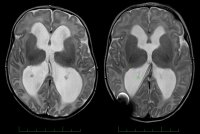 entriculoperitoneal short circuit is an implant consisting of silicone tubing and a valve. The tube is surgically inserted into the cerebral ventricle. The second part of the system drains fluid through the subcutaneous tissue into the abdominal cavity. The valve is located behind the ear and regulates the permeability of the fluid. At present, the vast majority of so-called programmable shorts are being introduced, which can be readjusted with a magnet over the skin according to the patient's needs. Exceptionally, a short circuit cannot be inserted into the abdominal cavity. In this case, a short circuit can be introduced into the venous system, specifically into the upper vena cava, then it is a ventriculoatrial short circuit. Occasionally, a lumboperitoneal short circuit can also be introduced. It is a connection of the spinal canal with the abdominal cavity.
entriculoperitoneal short circuit is an implant consisting of silicone tubing and a valve. The tube is surgically inserted into the cerebral ventricle. The second part of the system drains fluid through the subcutaneous tissue into the abdominal cavity. The valve is located behind the ear and regulates the permeability of the fluid. At present, the vast majority of so-called programmable shorts are being introduced, which can be readjusted with a magnet over the skin according to the patient's needs. Exceptionally, a short circuit cannot be inserted into the abdominal cavity. In this case, a short circuit can be introduced into the venous system, specifically into the upper vena cava, then it is a ventriculoatrial short circuit. Occasionally, a lumboperitoneal short circuit can also be introduced. It is a connection of the spinal canal with the abdominal cavity.
Spinal surgery
Spinal surgery deals with the surgical treatment of diseases of the spine and nerve structures associated with the spine. These are mainly degenerative spinal disorders, but also cancers, injuries and infections.
Difficulty with degenerative spinal disorders is one of the most common diseases dealt with by GPs and one of the most common causes of incapacity for work in working-age patients. These problems usually respond well to conservative treatment - analgesics, anti-inflammatory drugs, physical therapy and physiotherapy - rehabilitation.
Backbone surgery is the method of choice if conservative pain treatment does not bring a significant effect or the patient's problems worsen, or there is already a disorder of sensitivity or movement of the limbs. These symptoms can be caused by the oppression of nerve structures. This occurs in degenerative diseases of the spine for various reasons, especially:
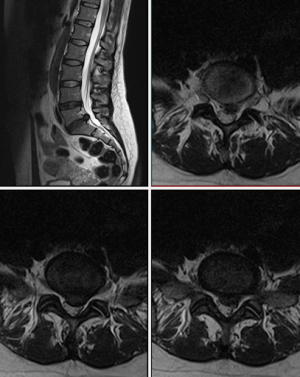 Prolapse of the intervertebral disc (disc hernia) - it is created by pushing the middle jelly-like part of the disc through a crack in the fibrous ring and its subsequent pressure on the spinal cord or spinal nerve in the spinal canal, with a negative effect on nerve functions.
Prolapse of the intervertebral disc (disc hernia) - it is created by pushing the middle jelly-like part of the disc through a crack in the fibrous ring and its subsequent pressure on the spinal cord or spinal nerve in the spinal canal, with a negative effect on nerve functions.- By reducing bone structures and ligaments - osteochondrosis, where bone growths and swollen ligaments narrow the spinal canal (so-called spinal stenosis) or spinal nerve outlets (so-called foraminostenosis). There can also be a pathological shift of the vertebrae relative to each other (so-called spondylolisthesis) - these changes also lead to the oppression of nerve structures.
- Spinal instability and pathological vertebral displacement - it is a mutual pathological shift of the vertebrae relative to each other (so-called spondylolisthesis) - these changes also lead to the oppression of nerve structures, which can increase under load but also at rest.
Why does spinal degeneration occur?
Degenerative spinal cord injury is the result of the gradual wear and tear of the spine like any other organ associated with aging. Bone structures and ligaments thicken with age, the vertebrae move relative to each other, and the discs become less flexible over time and are more susceptible to damage even with relatively little physical activity. Lifting a heavier load or slipping can be a direct cause of prolapse in the terrain of a degenerative plate. Factors influencing degeneration are in particular: overweight, physically demanding work, hereditary predisposition and smoking.
Degenerative spinal disorders mainly affect the two most congested sections of the spine:
- Lower cervical spine
- Lower lumbar spine and its transition to the sacral region
How does degenerative spinal disease affect?
The symptoms depend on where the degenerative process is located and whether it puts pressure on the nerve structures. Back pain is very common with different ways of promoting pain in the upper or lower limbs. More often, the problem manifests itself more intensely on one side than symmetrically in both limbs.
- Pain in the affected part of the spine
- Upper or lower limb pain - the disease in the lumbar spine is manifested by pain in the buttocks, thighs, calves or feet. An injury in the cervical spine usually results in pain in the shoulder or arm. This pain is exacerbated by coughing, sneezing or changing position.
- Numbness or tingling - in addition to pain, people often have numbness or tingling in the upper or lower limbs.
- Muscle weakness - muscles that are innervated by the affected nerves tend to weaken. This can cause falls or limitation of limb function and in the long run can lead to muscle atrophy and subsequent irreversible damage to the mobility of the limb.
- Walking disorders and balance problems
- Kaudy syndrome - with a large prolapse of the disc in the lumbar region, all nerve roots in the spinal canal are oppressed with paralysis of the lower limbs, inability to urinate and insensitivity of the intimate parts. Attention! This condition requires urgent operation!
How is degenerative spinal disease examined?
A set of the following tests is used to determine the correct diagnosis:
- Clinical examination - Muscular strength, sensitivity, reflexes and gait are specifically examined. The anamnesis of how long the problem lasts, whether it depends on physical activity, different types of pain relief positions, etc. is also important.
- Imaging examination:
- X-ray examination with functional images (forward, tilt) shows the position of the spine, vertebral displacement and instability. It can also reveal other causes of problems, such as infections, tumors or vertebral fractures. Even the so-called ordinary X-ray is important and necessary for making a diagnosis!
- Magnetic resonance imaging (MRI) Today, it is an ideal test to determine the type of spinal disease. It shows protruding discs, narrowing of the spinal canal and which nerves are affected. It is not exposed to radiation. Today (with a few exceptions) standard preoperative examination.
- Computed tomography (CT) is a benefit in the assessment of bone changes and thus the processes that most affect bone structures - fractures and tumors. It is faster available and can be used by the vast majority of patients.
- X-ray and CT myelogram is only used if the patient cannot undergo an MRI scan. A contrast agent is applied to the spinal canal, and subsequent pathology can be better detected by subsequent imaging. Today, it is basically fully replaced by MRI.
- Electrophysiological examination
Various electrophysiological methods are used to examine the functionality of nerve structuresConduction studies Nerve conduction examination (NCS) measures electrical nerve impulses through electrodes placed on the skin.- Electromyography (EMG) - their electrical activity is evaluated by means of electrodes placed in different muscles.
- Motor Evoked Potentials (MEP) - monitors the integrity of the pyramid path (path for limb mobility) using magnetic stimulation in the head area with sensing of activity in the limb muscles. In case of its damage, it is then possible to determine where the damage occurred.
- Somatosensory evoked potentials (SSEP) - We monitor the integrity of the somatosensory pathway (the pathway leading to the limbs) by stimulating the limb area by sensing activity in the head area.
How is degenerative spinal disease treated?
Depending on the severity of the problem and its duration, different procedures apply. A number of specialists take part in the treatment, especially general practitioners, neurologists, physiotherapists, interventional radiologists and spinal surgeons.
- Conservative treatment:
- regime measures with avoidance of activities that cause pain, weight loss
- painkillers, inflammation (paracetamol, ibuprofen, diclofenac, ...), muscle relaxants (muscle relaxants), drugs affecting neuropathic pain (pregabalin, gabapentin) or antidepressants (tricyclic antidepressants)
- physical therapy and physiotherapy - rehabilitation
- corticoids, opioids and infusion therapies
- Semi-invasive therapy:
 CT guided periradicular therapy (CT PRT) is a procedure in which a needle is inserted under CT control to a painful nerve root with subsequent application of a local anesthetic and corticoid.
CT guided periradicular therapy (CT PRT) is a procedure in which a needle is inserted under CT control to a painful nerve root with subsequent application of a local anesthetic and corticoid.- caudal block (KB) is a procedure in which a local anesthetic and a corticoid are applied to the spinal canal in the coccyx area with or without imaging control.
- sacroiliac blockade (SIB) is a procedure in which a local anesthetic and corticoid are applied to or around the SI joint under or without imaging control.
- CT-guided facet blockade is a procedure in which a needle is inserted under CT control to the affected posterior joint of the spine, if it is a source of pain.
- Surgical treatment
Only a small proportion of patients with degenerative spinal disorders are eventually indicated for neurosurgery. E.g. in patients with a diagnosis of intervertebral disc herniation, it is about 10%. This is the case if, after 6 weeks to 3 months of adequate conservative treatment, the problem does not subside, a sudden severe weakening of muscle strength occurs, or symptoms of cauda develop (see above). Spine surgeries are considered a fully established and safe procedure. However, like any other operation, they carry the risk of complications, such as bleeding, infection, cerebrospinal fluid leakage, injuries to blood vessels, nerves or other structures in and around the spine.
Different types of spine surgeries include:
- Decompression operations:
- Discectomy is the removal of the protruding part of the intervertebral disc in order to relax the spinal nerve. The most commonly used surgical approach is the back of the lumbar spine and the front of the cervical spine.
- Laminectomy is the removal of the posterior vertebral arches. The dilation of the spinal canal then relaxes the nerve structures (spinal cord and nerve roots).
- Foraminotomy is the targeted release of the spinal root at the point of its departure from the spinal canal.
- Instrumented performances:
- Fusion and internal fixation is a permanent connection of two or more vertebrae. This type of so-called stabilization operation is used to eliminate painful movements between the vertebrae, which arise due to degeneration or injury of the disc. Nervous structures are also relaxed during the procedure.Replacement of damaged intervertebral disc with artificial disc (arthroplasty) is a less frequently performed type of operation, suitable only for a small group of patients meeting strict indication criteria. The advantage of this method is the maintenance of momentum in the operated segment.
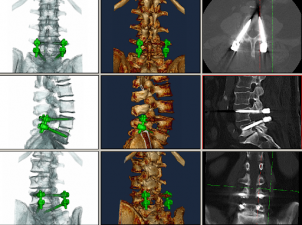
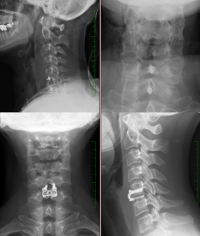
During spine operations, we can choose different ways of surgical solution. Each approach has certain advantages and disadvantages, and if we choose this approach, we consider it the best for the patient. The long-term results are, regardless of approach, the same:
- Open access is a way to achieve excellent clarity of anatomical conditions at the cost of higher soft tissue trauma. This is a standard operating procedure.
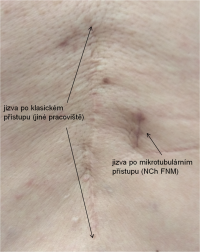 Minimally Invasive Spine Surgery (MISS) is a set of practices designed to minimize disability
Minimally Invasive Spine Surgery (MISS) is a set of practices designed to minimize disability  surrounding healthy tissues by the surgical approach used. The very goal of surgical procedures, ie relieving the oppression of nerve structures or introducing instruments (cages, screws, rods) and performing backbone fusion, is the same as for open operations. However, patients after these operations tend to have less postoperative pain and faster healing of the surgical wound, and thus faster recovery and return to normal life activities. However, on the one hand, these approaches place greater demands on the surgeon's experience and also require special workplace equipment. High-quality X-ray amplifiers, perioperative CT or spinal navigation are used to precisely target the surgical procedure. Our department has been dealing with the development of minimally invasive spinal surgery (MISS) techniques as one of the first in the Czech Republic since 2004.
surrounding healthy tissues by the surgical approach used. The very goal of surgical procedures, ie relieving the oppression of nerve structures or introducing instruments (cages, screws, rods) and performing backbone fusion, is the same as for open operations. However, patients after these operations tend to have less postoperative pain and faster healing of the surgical wound, and thus faster recovery and return to normal life activities. However, on the one hand, these approaches place greater demands on the surgeon's experience and also require special workplace equipment. High-quality X-ray amplifiers, perioperative CT or spinal navigation are used to precisely target the surgical procedure. Our department has been dealing with the development of minimally invasive spinal surgery (MISS) techniques as one of the first in the Czech Republic since 2004.
How does hospitalization take place by default?
We indicate patients most often from our Neurosurgical Outpatient Clinic at the Motol University Hospital (node “A”, 3rd floor), some patients are indicated from special multidisciplinary seminars or, by appointment, directly from the cooperating departments of other hospitals. For patients indicated for the planned operation, we require a complete internal preoperative examination, which is usually performed by a general practitioner with whom the patient is registered. We accept patients for hospitalization the day before the planned operation. On the day of admission, we will check the internal preoperative examination and a preoperative anesthesiology consultation will take place. The day after admission, we perform the planned operation under general anesthesia, most often in the patient's position on the abdomen in lumbar spine surgery and in the patient's position on the back in cervical spine surgery. On the first postoperative day, the patient is usually already mobilized from the bed and undergoes specific postoperative rehabilitation. After some types of surgery, it is necessary to wear a lumbar corset or neck collar (4-6 weeks). Depending on the scope of the operation and the clinical condition, the patient is subsequently released to home care on the 3rd - 5th postoperative day with a precise rehabilitation plan and after a basic exercise by a physiotherapist. After 4-6 weeks after the operation, an outpatient check-up will take place, if necessary with the addition of a follow-up imaging examination (X-ray) and a subsequent recommendation for rehabilitation in the slope under the guidance of a physiotherapist, or with a recommendation for a spa stay. In patients with a good postoperative clinical course, it is also possible to return quickly to normal life activities, including a return to the patient's work activities - this depends mainly on the profession performed.
What can be expected from the operation?
Properly indicated and timely surgery for degenerative diseases of the spine leads to a significant remission of the original problems in the vast majority of patients. In particular, the relief from the pain in the limbs is significant, the back pain tends to be less affected. An important condition for a good result is the correct cooperation of the patient after the operation, it is necessary to adjust the lifestyle, lifestyle, exercise, according to the recommendations to undergo rehabilitation, avoid risky activities, extreme physical activity, etc. Surgery is not an absolute treatment in itself or at least reduce the causes that led to the problem. If the relevant recommendations are followed, the patient is highly likely to maintain good physical condition after spinal surgery, including normal exercise, sports, and continuing previous work activities.
Peripheral nerve surgery
Peripheral nerve surgery is a subfield of neurosurgery that deals with the surgical treatment of peripheral nerve pathologies (peripheral neuropathies) - especially narrowing syndromes, injuries and tumors of the peripheral nerves.
The peripheral nerve is the connection between the central nervous system (CNS - brain and spinal cord) and other parts of the body. These nerves carry information from the body (touch, pain, heat, cold, smell, taste), which the brain then evaluates and through the nerves then gives instructions through which we can perform various activities - walk, talk, swallow, etc. The nerve itself consists from the fibers that conduct nerve impulses and from the sheaths that protect nerve fibers as very fragile structures.
How does peripheral nerve damage manifest itself?
Peripheral nerve damage causes symptoms whose severity (mild, moderate, severe disability) and impact on daily activities depend on the nature, severity and location of the disability, as well as the structure of the nerve itself. The following may be affected:
- Motor fibers / nerves they control will-controlled muscles and activities such as walking, talking or holding and working with objects. Damage causes muscle weakness, cramps and muscle twitching.
- Sensitive fibers / nerves they transmit information about touch, temperature and pain. Their damage causes numbness or tingling in various parts of the body, mainly the hands or feet. In addition to sensitivity disorders, there are also problems with the perception of pain, temperature or balance.
- Autonomic fibers / nerves regulate the activity of internal organs (heart, lungs and digestive tract) and skin (sweating, blood circulation).
- Mixed peripheral nerves. Because most peripheral nerves contain both motor, sensitive and autonomic fibers, their involvement is manifested by a combination of the above symptoms.
What are the most common causes of neurosurgically treatable peripheral neuropathies?
The most common diseases of the peripheral nerves that we deal with in our workplace are narrowing syndromes (compression - caused by oppression of the peripheral nerves), injuries and tumors of the peripheral nerves. A special chapter is the diagnostic biopsies of the sural nerve and resuscitation procedures.
Narrowing syndromes occur due to the oppression of nerves in typical locations. The oppression of the median nerve in the wrist area arises carpal syndrome tunnel, by oppression of the ulnar nerve in the elbow area again ulnar sulcus syndrome. Lower limb injuries are less common. Pressure on the sensitive nerve for the front of the thigh is created paraletic meralgia, by pressing on the calf nerve in the inner ankle area again tarsal tunnel syndrome. Strait syndromes are rare in other locations as well.
Carpal tunnel syndrome
This most common narrowing syndrome is manifests typically night armor of the thumb, forefinger and middle finger with gradual worsening of symptoms, frequent night waking with knocking of the affected hand. Later, the problem occurs during the day, there is a loss of sensitivity with objects falling out of the hand. It arises due to the oppression of the medial nerve in the area of the carpal tunnel, which is a narrow transition in the wrist area, which is formed by the wrist bones and the ligament that spans this tunnel. Causes its origin is diverse, there is often no single cause, a combination of risk factors usually contributes to the development of the disease:
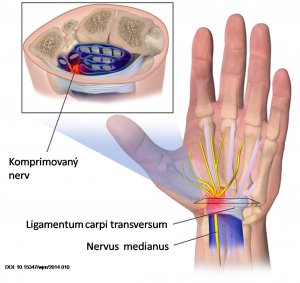 Anatomical conditions - congenitally narrower carpal tunnel (women), wrist fractures, inflammatory changes (rheumatoid arthritis), swelling (hormonal treatment, pregnancy)
Anatomical conditions - congenitally narrower carpal tunnel (women), wrist fractures, inflammatory changes (rheumatoid arthritis), swelling (hormonal treatment, pregnancy)- Increased nerve vulnerability, in metabolic diseases, e.g. diabetes
- Wrist overload - work with vibrating machines, or repeated long-term bending of the wrist, work with a computer mouse, etc.
It is usually enough to make a correct diagnosis anamnesis with a description of typical symptoms and an objective examination at a neurological and subsequently neurosurgical outpatient clinic with confirmation by electrophysiology:
- Clinical examination - includes anamnestic description of typical symptoms and targeted examination of sensitivity, muscle strength and provocative stimuli.
- Electrophysiological examination
Electrophysiological methods are used to confirm the disability and determine its severity:- Conduction studies Nerve conduction examination (NCS) measures electrical nerve impulses through electrodes placed on the skin.
- Electromyography (EMG) - their electrical activity is evaluated by means of electrodes placed in different muscles.
- Imaging examination - in exceptional cases, that the change in anatomical conditions arises on the basis of post-traumatic or post-inflammatory changes, it is necessary to add X-ray, magnetic resonance imaging (MRI), ultrasound (USG) or computed tomography (CT) affected areas.
Therapy Median nerve oppression in the wrist areas - carpal tunnel syndrome - is conservative in the case of mild disability. If the symptoms are severe or do not respond to conservative treatment, surgical treatment is indicated. Only the right treatment is the precondition for the disappearance or at least the alleviation of symptoms and the restoration of wrist and hand function. If it does not happen in time, it is possible that changes in the structure of the nerve will cause permanent impairment, without the possibility of improving the symptoms or function of the nerve by any treatment.
- Conservative treatment consists of measures to reduce wrist and hand overload by improving the posture and ergonomics of typing or using a computer mouse, avoiding symptomatic activities, keeping hands warm, and taking short breaks during evoking activities. Of course, there is a possible treatment of diseases that contribute to the development of carpal tunnel syndrome - compensation of diabetes or rheumatoid arthritis. In the event that the regime measures are not sufficiently effective, the following procedures temporarily help. These procedures help temporarily, do not eliminate the cause and are especially suitable if the underlying cause (eg pregnancy) disappears over time:
- Night splinting of the wrist
- Nonsteroidal anti-inflammatory drugs
- Opico wrist corticoids
- Surgical treatment The carpal tunnel consists in removing the oppression of the median nerve by cutting the ligament that bridges the carpal tunnel.
The operation can be performed in two ways:- Endoscopically, in which the transverse ligament is crossed under endoscopic control from one or two access sections.
- Openly, in which the nerve is released from a small incision under direct visual control.
At our workplace, we currently prefer an open approach, which achieves very good results with a minimum of postoperative complications. The procedure is performed on an outpatient basis, in the operating room. In local anesthesia, we cut the transverse ligament from a short incision and thus relax the affected nerve. After suturing the wound and sterile covering, the patient goes home. We perform the procedures once a week on Friday, followed by an inspection of the wound the next Tuesday, and then a weekly inspection with removal of stitches. With this technique we achieve excellent long-term results with a minimum of complications. These include: incomplete nerve relaxation, scar formation with recurrent disease, wound infections or nerve and vascular injuries. Mild wrist pain or nerve sensitivity when squeezing the hand are natural consequences of the nature of the exercise and are only temporary. Internal healing takes several months, even if the skin heals in a few weeks. A return to normal activities can be expected immediately after the wound has healed. The return to the work process depends mainly on the professional classification - from 2 weeks to 3 months after the operation.
Ulnar sulcus syndrome
Ulnar sulcus syndrome is the second most common narrowing syndrome caused by compression of the ulnar nerve in the elbow area (so-called palate). It manifests itself in pain radiating along the inner edge of the forearms of the ring finger and little finger with decreased sensitivity in this area. Late and severe disability, requiring early surgical treatment, but with an already controversial effect, is evidenced by gripping disability, weakness of the small muscles of the hand and fixed bending of the little finger and ring finger. The causes, diagnostic modalities (clinic, EMG, imaging) and treatment procedures (regimen measures, abdominals, operations - endoscopically or openly) are practically identical to the carpal tunnel syndrome with an emphasis on removing elbow pressure during sitting and overloading muscles during rotation in the elbow during regimen measures and differentiation from orthopedic diagnosis of tennis elbow during the diagnostic process.
At our workplace, we relax the ulnar nerve in the elbow area during short hospitalizations, seductive (axillary block) or general anesthesia. From a short incision in the area of the inner side of the elbow, we release the nerve in its entirety. If necessary, it is sometimes important to change the position of the nerve (nerve transposition). The wound is sutured and covered. The next day the patient usually goes to home care, the stitches are removed on the 10th - 12th postoperative day.
Peripheral nerve tumors are relatively uncommon. Their cause is usually unknown, some occur in hereditary syndromes (eg neurofibromatosis 1 and 2 - NF1 and NF2). These are usually benign tumors, but they can lead to significant nerve damage with loss of function. They affect both the cranial nerves and the spinal nerves. Damage to peripheral nerves by a tumor can be caused by tumors that grow out of the nerve (intraneural tumors - most often swan, neurofibroma, rarely perineurinoma) or by the pressure of tumors growing from the surrounding tissues with pressure on the nerve (extraneural tumors - most often lipoma from adipose tissue, and ganglion cyst - from the joint).
Diagnosis peripheral nerve tumor with a proposal for further action is determined on the basis of the following examinations:
- Clinical examination - includes an anamnestic description of symptoms and an objective finding during a targeted medical examination (lump during the nerve, pain, tingling, decreased sensitivity or muscle weakness).
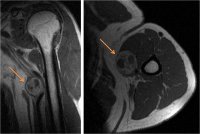 Imaging examination - In order to clarify the nature of the tumor, determine the extent of nerve involvement and the relationship to the surrounding structures, it is necessary to perform some imaging modality - magnetic resonance imaging (MRI), ultrasound (USG) or computed tomography (CT).
Imaging examination - In order to clarify the nature of the tumor, determine the extent of nerve involvement and the relationship to the surrounding structures, it is necessary to perform some imaging modality - magnetic resonance imaging (MRI), ultrasound (USG) or computed tomography (CT).- Electrophysiological examination
Electrophysiological methods are used to confirm the nerve disorder and determine its severity:- Conduction studies Nerve conduction examination (NCS) measures electrical nerve impulses through electrodes placed on the skin.
- Electromyography (EMG) - their electrical activity is evaluated by means of electrodes placed in different muscles.
Histological examination of the tumor, is an indispensable condition for making a definitive diagnosis of a peripheral nerve tumor type. Samples are examined after tumor biopsy or removal.
The goal of neurosurgical treatment of peripheral nerve tumors is to obtain a sample for histological examination and, if possible, complete removal of the tumor while maintaining nerve continuity, which creates a precondition for the restoration of its affected function. An important prerequisite for achieving this goal is (routine at our workplace) the use of microscopic or exoscopic control during the procedure, perioperative neurophysiological monitoring and quality postoperative neurorehabilitation. If the tumor grows through the whole nerve and the functional fibers are not preserved, after removal of the tumor, the reconstruction phase of the operation continues with direct suturing of the nerve stumps, the use of nerve grafts or resuscitation (see below).
Peripheral nerve injuries are relatively common. In this area, our clinic works closely with the trauma team of the FNM Orthopedic Clinics. Peripheral nerve injuries occur as a result direct nerve damage in open injuries with a sharp object (or a fragment of a fracture, or iatrogenically - during the procedure from another indication) with a partial or complete interruption of the nerve and surrounding structures, or indirectly in closed traction injuries, when the nerve is structurally solid but its function fails. From this comes another treatment strategies:
- In case of indirect injury a conservative procedure with neurorehabilitation (including electrostimulation) and other long-term (months) clinical and electrophysiological monitoring (EMG and NCS, see above) is chosen, with the assumption of gradual restoration of nerve function. If this is not the case, the patient is indicated for delayed surgical revision - most often nerve release, microsurgical removal of the affected part, reconstruction with a nerve graft and other intensive neurorehabilitation with electrostimulation.
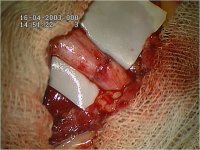 In case of direct injury the primary goal is the early restoration of nerve continuity by suturing the affected nerve directly or using a nerve graft. Prerequisite for the restoration of nerve function is early treatment, microsurgical surgery under microscopic or exoscopic control and subsequent intensive neurorehabilitation, including electrical stimulation. The operation is followed by repeated clinical and electrophysiological examinations (EMG and NCS, see above) with monitoring of the gradual restoration of the affected nerve function. The functions of the affected nerves are restored for a long time - months after the injury.
In case of direct injury the primary goal is the early restoration of nerve continuity by suturing the affected nerve directly or using a nerve graft. Prerequisite for the restoration of nerve function is early treatment, microsurgical surgery under microscopic or exoscopic control and subsequent intensive neurorehabilitation, including electrical stimulation. The operation is followed by repeated clinical and electrophysiological examinations (EMG and NCS, see above) with monitoring of the gradual restoration of the affected nerve function. The functions of the affected nerves are restored for a long time - months after the injury.
If the peripheral nervous system is affected by the nature of progressive peripheral neuropathy, in some cases it is necessary to take a sample of the peripheral nerve to determine the correct diagnosis and then determine the appropriate treatment procedure. The operation takes place on an outpatient basis, under local anesthesia, when a part of the sensitive nerve - the sural nerve - is removed from a short incision behind the external ankle, followed by a loss of sensitivity in a small area of the external instep. Further treatment is then determined on the basis of the result of histological examination by the sending neurological department or the Rheumatology Institute of the General Hospital.
In case of permanent impairment of peripheral nerve function, they represent an alternative enabling the restoration of this function by resuscitation. These procedures are mainly used to restore the function of the paretic (paralyzed) face with the use of passive and dynamic curtains, both in adult patients and in children with Moebi syndrome. This program of our clinic is unique in the Czech Republic and takes place in cooperation with plastic surgeons from the Surgical Clinic of the 2nd Medical Faculty of Charles University and the National Hospital.
Craniocerebral trauma
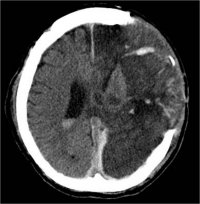
The term craniocerebral trauma (KCT) covers all injuries to the soft skulls, skull and especially the brain. The spectrum of injuries is very wide - from a common "bulge" to severe brain injury with permanent consequences or death. We distinguish the so-called primary brain injury, which we can imagine as the very "wound" that the brain receives at the moment of injury. This story is irreversible and no longer therapeutically uncontrollable. The only area where we can intervene is prevention - the consistent use of protective equipment (helmets in sports, etc.). On the contrary, the so-called secondary brain injury it arises as a result of an increase in intracranial pressure, often as a result of injury to the primary or other mechanisms acting during the injury itself (eg blood loss or impaired blood oxygenation). When the pressure inside the skull increases, the blood supply to the brain worsens, which can eventually lead to the death of its entire parts not affected by the injury. Therapeutic efforts are directed primarily in this way.
The most common causes of KCT are traffic accidents and various types of falls, such as stairs. Uncommon injuries are sports and work accidents or injuries after physical assault. Some injuries bleed profusely from injured skin and are not as severe. On the contrary, some injuries look easy, but are very dangerous, especially in patients who take anticoagulants - Warfarin, Pradaxa, Anopyrin, etc. Very risky are falls from more than 1 meter or 5 steps, pedestrians collided with a car, car accidents in high speed and fall on a bike without a helmet. Patients with a head injury are first examined by the Emergency Care Department by a multidisciplinary team - neurosurgeon, traumatologist, neurologist, radiologist and intensivist. The basic imaging examination for these patients is computed tomography (CT), which shows possible skull fractures, cerebral hemorrhages or cerebral contusions - bruises. It also allows you to diagnose any other injuries (eg spine, chest, abdomen or limbs). Further care depends on the weight of the KCT. Some injuries (see below) require an urgent surgical solution, other times we proceed conservatively and monitor the patient by checking the clinical condition and CT. If the patient is put into "artificial sleep", we monitor the intracranial pressure and other parameters with a special probe. When the condition worsens, it is sometimes necessary to intervene surgically and prevent further disability.
Examples of KCT
Apart from the pathophysiological division into primary and secondary, brain injuries can be distinguished according to the extent of the lesion into local and diffuse.
- Local (focal)
- Epidural hematoma there is bleeding between the skull and the dura mater. It is most often caused by an injury to the meningica media or a cranial fracture. With early surgery, it has a relatively favorable prognosis, the brain is only suppressed and does not have to be injured at all.
- Subdural hematoma we define the presence of blood on the surface of the brain, under the dura mater and its components are almost always:
- Brain contusion, ie the site of contusion of the brain. Subdural hematoma and the contusions present with it are inevitably associated with brain damage and thus neurological impairment.
- Diffuse (global)
- Diffuse axonal injury (DAP) is a multiple microscopic traumatic involvement of brain cells, especially their fibers transmitting nerve impulses.
- Diffuse vascular disease represents multiple microscopic traumatic involvement of cerebral vessels.
Treatment of brain injuries
- Conservative treatment - Patients with brain injuries that do not require immediate surgery are hospitalized in an intensive care unit, given medicines to reduce brain swelling, medicines to protect against epileptic seizures, and possibly antibiotics for infectious complications. Pain medication is a matter of course. Another priority is the normalization of blood clotting and the internal environment. During hospitalization, we monitor the neurological status of patients, perform control imaging examinations, especially CT and MRI. If, despite the maximum therapeutic effort, the clinical condition or finding on CT worsens, there is no choice but to intervene surgically.
- KCT operational solution aims to:
- Eliminate expansive bleeding and treat its source (eg treat vascular injury in epidural hematoma).
- Treat cranial fractures, in case of open injury also "clean up" the wound from foreign material.
- Relieve the increasing intracranial pressure by temporarily "opening" the skull so that the swollen brain is not cramped by the skull for a transient period. The removed skull bone is returned after about 6 weeks to 6 months, or replaced with artificial material.
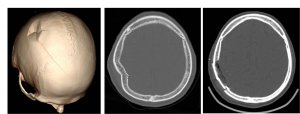
Craniostenosis
Craniosynostosis is defined as the premature closure of one or more cranial sutures leading to skull deformity. Craniosynotoses can occur as an isolated defect or as part of a specific syndrome. The diagnosis is usually made soon after birth. Clinical examination (typical head shape), cephalometry, or X-ray lbi, 3D CT and genetic examination play an important role in the diagnosis.
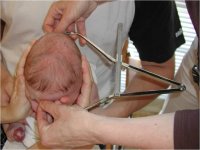 It is important to dynamically evaluate the shape of the head using cephalometry (craniometric examination). The so-called cephalic index (CI) is determined as a percentage of the ratio of the width and length of the skull. Untreated craniosynostosis leads to progressive deformities of the skull and thus to inhibition of brain growth with an increase in intracranial pressure, which may result in functional neurological or visual impairment. Early diagnosis and early surgical treatment is therefore essential for the further development of the child. In disabilities unrelated to other birth defects or syndromes the further psychomotor development of the child is not affected after the surgical solution.
It is important to dynamically evaluate the shape of the head using cephalometry (craniometric examination). The so-called cephalic index (CI) is determined as a percentage of the ratio of the width and length of the skull. Untreated craniosynostosis leads to progressive deformities of the skull and thus to inhibition of brain growth with an increase in intracranial pressure, which may result in functional neurological or visual impairment. Early diagnosis and early surgical treatment is therefore essential for the further development of the child. In disabilities unrelated to other birth defects or syndromes the further psychomotor development of the child is not affected after the surgical solution.
The incidence of craniosynostosis is reported to be around 1 / 2000-1 / 3000 births. In the Czech Republic, 40-50 new cases are diagnosed annually. The indication for surgery is therefore not only for cosmetic reasons, but above all in terms of preventing brain damage.
The main types of craniosynostosis
 Skafocephalalie is the most common type, the sagittal suture is closed prematurely. The scaphocephalic cerebellum is very narrow, very long, has a wide frontal area and a very narrow head.
Skafocephalalie is the most common type, the sagittal suture is closed prematurely. The scaphocephalic cerebellum is very narrow, very long, has a wide frontal area and a very narrow head.
Trigonocephaly is the second most common synostosis. The metopic seam is closed prematurely. There is a prominence of the central part of the frontal bone and a deformity of the orbits. Seen from above, the skull has the shape of a triangle, the eyes are close together.
 Frontal plagiocephaly arises on the basis of a one-sided premature coronary suture closure. Flattening of one side of the forehead, deformation of the orbit and superciliary arc occur.
Frontal plagiocephaly arises on the basis of a one-sided premature coronary suture closure. Flattening of one side of the forehead, deformation of the orbit and superciliary arc occur.
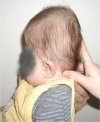 Brachycephaly occurs when bilateral coronary suture closes on both sides.
Brachycephaly occurs when bilateral coronary suture closes on both sides.
The head is very wide and very short due to the compensatory growth in width. Premature coronary suture synostosis is most often part of craniosynostosis syndromes (Crouzon's syndrome, Apert's syndrome, Muenke's syndrome and others).
![]() Rarity occipital plagiocephaly arises on the basis of premature closure of the lambda seam on one side. It needs to be distinguished from postural (deformational, positional) plagiocephaly, which is not indicated for the operation and in indicated cases is solved with the help of modeling helmets.
Rarity occipital plagiocephaly arises on the basis of premature closure of the lambda seam on one side. It needs to be distinguished from postural (deformational, positional) plagiocephaly, which is not indicated for the operation and in indicated cases is solved with the help of modeling helmets.
Surgical treatment of craniosynostosis
The indication for surgical treatment is not only cosmetic but also functional. From a cosmetic point of view, the child's worse social adaptation in the future must be taken into account. Children with untreated craniosynostosis are often socially isolated and stigmatized. In adulthood, they suffer from poorer social adaptation and personality disorders. The aim of the operation is to increase the intracranial volume and optimize the shape of the head. There are a number of surgical techniques depending on the type of synostosis and the age of the child (suture discision, strip craniectomy during the affected seam, cranial remodeling, distraction methods, endoscopic techniques). In recent years, the number of endoscopic procedures with subsequent modeling of the head using a helmet has been increasing. The operations are to be performed in super-specialized workplaces focusing on pediatric neurosurgery. The operation is usually performed before the child's first year of age, optimally between 4-7 months for sagittal synostosis and between 6 months and 1 year for coronary, metopic and lambda synostosis. For minimally invasive endoscopic procedures, a solution up to 3 max. 5 months of age is recommended. But it always depends on the degree of deformity and other factors. Follow-up is performed on an outpatient basis at 3, 6 and 12 months after the operation, and once a year until the age of 7 for simple craniosynostoses, and for complex synostoses even longer. A necessary part of the inspections is a craniometric examination. Reoperations in simple craniosynostoses are rare, in complex ones in 20-30%. To achieve the optimal effect of remodeling surgery, early diagnosis of craniosynostosis and early examination at a specialized workplace that performs these surgeries is necessary. The first examination should take place preferably by 3 months of age, when considering endoscopic procedures as soon as possible (approximately 1 month of age). Early diagnosis and appropriate timing and execution of the operation will best enable favorable head growth, physiological psychomotor development of the child and optimal cosmetic effect.
Spinal dysraphisms
Under the term spinal dysraphisms we mean conditions arising from a disorder of the closure of a part of the spinal canal and the neural tube affecting the shape and function of the spine, spinal cord and nerve roots. They most often occur in the lumbar region.
Why do spinal dysrafisms arise?
The reasons for their emergence are not yet fully understood. Genetic factors in combination with environmental influences play an important role here. In particular, proper nutrition of pregnant women in the early stages of pregnancy (when there is a fundamental development of the spine and spinal cord), especially adequate levels of folic acid proves to be an important factor in preventing their occurrence.
What types of spinal dysraphisms do we know?
Spinal dysraphisms can be divided into openly (nerve structures communicate with the external environment) a closed. The individual subtypes listed below can be combined in various ways.
- Open dysrafisms:
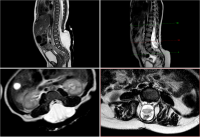 Myelomeningocele (spina bifida aperta) is a disease in which nerve structures (spinal cord and nerve roots) get sore on the back surface with various disorders of the closure of the layers that naturally cover the nerve structures (spinal canal, dura mater, subcutaneous tissue, skin). They often occur in combination with other disorders of the nervous system, such as congenital hydrocephalus or developmental disorders in the area of the posterior fossa - Chari's malformation.
Myelomeningocele (spina bifida aperta) is a disease in which nerve structures (spinal cord and nerve roots) get sore on the back surface with various disorders of the closure of the layers that naturally cover the nerve structures (spinal canal, dura mater, subcutaneous tissue, skin). They often occur in combination with other disorders of the nervous system, such as congenital hydrocephalus or developmental disorders in the area of the posterior fossa - Chari's malformation. - Dermal sinus tract represents an open canal connecting the skin to the spinal canal and spinal cord, often in combination with benign developmental tumors - with an epidermoid (containing skin layers) or with a dermoid (containing hair or cartilage or bone tissue).
- Closed dysraphisms:
- Spina bifida occulta occurs when the spinal canal occlusion of one or more vertebrae is affected without affecting the spinal cord and nerve roots. This condition usually does not cause clinical problems and does not require treatment.
 Spinal cord cleft (diastematomyelia) is an example of complex spinal dysrafism in which the spinal cord is divided into two halves, often with a cartilaginous or bony septum that causes the spinal cord to fix.
Spinal cord cleft (diastematomyelia) is an example of complex spinal dysrafism in which the spinal cord is divided into two halves, often with a cartilaginous or bony septum that causes the spinal cord to fix.- Spinal lipomas (lipomyelomeningocele) are conditions where abnormal adipose tissue (spinal lipoma) in the spinal cord, dura mater or surrounding area prevents the normal development of the spine and nerve structures (spinal cord and nerve roots).
- Fixed spinal cord, often occurs in combination with other disorders, when the spinal cord is firmly attached to the structures in the spinal canal, c o prevents its natural development with consequent impairment of neurological functions with complex consequences.
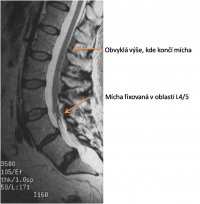
How and when do spinal dysrafisms manifest?
All forms of spinal dysrafism are present at birth because they are the result of a developmental disorder in the first weeks of pregnancy. It usually manifests at birth or during growth, rarely in adulthood. Some of these developmental disorders remain completely asymptomatic, or manifest only cosmetically in the form of multiplied hairs, colored spots or lumps in the lumbar region. Open dysraphisms are evident with the naked eye (myelomeningocele at birth, dermal sinus tract as the mouth of the canal in the lumbar region). As a result of the involvement of nerve structures (spinal cord and spinal roots), symptoms arise, the severity of which depends on the degree of disability and sometimes on their duration (the disability may worsen over time). These symptoms can be divided as follows:
- Neurological involvement of the lower limbs
- Muscle weakness to paralysis
- Sensitivity reduction to numbness
- Disorders of the bladder and intestines
- Urinary and fecal incontinence
- Orthopedic disability
- Deformation of the spine - scoliosis
- Deformities of the feet, ankles or legs
- Illness
How are spinal dysrafisms diagnosed?
Among the main diagnostic modalities that help us to detect spinal dysraphisms and determine the extent of spinal and nerve structures (and thus the correct surgical strategy) are:
- Prenatal screening ultrasonography (USG) a serological examination (AFP) - severe forms of spinal dysrafism can be diagnosed during pregnancy by screening for congenital malformations.
- Clinical examination - muscle strength, sensitivity, reflexes and sphincter function are specifically examined.
- Imaging examination - X - ray methods and above all magnetic resonance imaging (MRI) are a basic examination to determine the type and extent of disability.
- Electrophysiological examination methods such as urodynamic examination, anorectal manometry, electromyography (EMG) and somatosensory evoked potentials (SSEP) they help us determine the extent of functional impairment of nerve structures and its impact on the involvement of the bladder, anal sphincter, muscles and limb sensitivity.
Surgical treatment of spinal dysraphisms.
Unfortunately, surgery can no longer reverse the damage, but it will prevent further or deterioration of the existing and dramatically reduces the risk of infection. Surgical treatment of spinal dysraphisms varies by type. However, the objectives are generally valid and can be summarized as follows:
- Removal of excess tissue (eg fat in spinal lipomas, bone or cartilaginous tissue in spinal cleft).
- Release (deliberation) of nerve structures especially the spinal cord, thus preventing its further damage during growth.
- Layer reconstruction around nerve structures with a cosmetic effect and especially with a significant reduction in the risk of infection.
The way to achieve the optimal effect of the operation (to reduce the risk of infection and other neurological disabilities) is early diagnosis and surgery in the workplace dealing with the treatment of congenital malformations of the nervous system and also offers comprehensive treatment and monitoring. The Department of Neurosurgery for Children and Adults of the 2nd Medical Faculty of Charles University and the Motol University Hospital is one of the few workplaces that offers these possibilities. In an effort to optimize the result of surgery, we use:
- Microsurgical surgical technique
- Visualization using operating microscope or exoscope
- Specialized intraoperative electrophysioloic monitoring
In the next postoperative period, long-term comprehensive multidisciplinary (neurosurgical, neurological, orthopedic, urological and rehabilitation) treatment and monitoring is necessary.
Treatment of spasticity
At our neurosurgical clinic, we mainly deal with the treatment of pediatric patients with spasticity caused by cerebral palsy (DMO).
Cerebral palsy (DMO) and spasticity.
Cerebral palsy is the most common cause of spasticity and disability in children. It is caused by brain damage that occurs before, during or just after birth. Infections during pregnancy, preterm and complicated labor, low birth weight (up to 2 kg) and maternal infections are the most frequently mentioned risk factors for DMO. Unfortunately, this disability is irreversible, lifelong. Therefore, the treatment is focused on the treatment of the consequences - spasticity.
What is spasticity? How does it manifest and diagnose?
Spasticity is characterized by an increase in muscle tension. It often occurs in combination with so-called spastic dystonia, which is manifested by unnatural rotated holding of the limbs at rest. Due to the remodeling of soft tissues and joint structures, the long-term unnatural position of various parts of the body leads to contractures and deformities, which makes this position permanent. Spasticity can also occur later, in older children and adults, most often in patients with multiple sclerosis, after a stroke, after an injury or with cancer. Spasticity leads to a significant functional impairment of the patient, causes pain, disrupts sleep and leads to deformities, which significantly negatively affects the quality of life of both patients and their caregivers. It is diagnosed by a clinical examination, and its cause by magnetic resonance imaging (MRI), which confirms structural damage to the brain or spinal cord.
How common is cerebral palsy and associated spasticity?
The incidence of DMO has been stable for a long time - 1 in 500 births, despite the remarkable progress in health care in neonatal intensive care units and in the care of premature newborns, which we can observe in recent decades. Different degrees of spasticity develop in up to 80% of patients with DMO.
What are the treatment options for spasticity in patients with cerebral palsy?
Treatment of spasticity in children with DMO is complex and multidisciplinary (pediatrician, neurologist, neurosurgeon, orthopedist, rehabilitation physician, physiotherapist, prosthetist) and should be started as soon as possible.
The individual modalities for the treatment of spasticity in DMO are:
- Rehabilitation under professional guidance (physiotherapy, physical therapy, spa care) - exercise is the basis for influencing spasticity and preventing deformities and must be permanent, daily.
- Medication - e.g. diazepam, baclofen, clonazepam, dantrolene - systemically (whole body) reducing muscle tension. Their limitations are the side effects that occur at higher doses, which are sometimes necessary to affect spasticity.
- Topical application of botulinum toxin - Injections of botox into the muscles lead to their local relaxation. Recently, this method is widely used, it has no major side effects, but the effect is only temporary (3-4 months).
- Neurosurgical procedures:
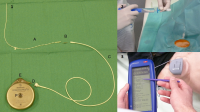 Baclofen pump implantation - this method ensures continuous administration of baclofen directly into the spinal canal, where it acts on the spinal cord, thereby reducing muscle tension. The pump is inserted into the subcutaneous tissue to the left of the navel approximately 5 cm below the last left rib. The tubule from the baclofen pump runs in the subcutaneous tissue over the side to the back and plunges into the spinal canal. The pump contains a battery that must be replaced approximately every 5-7 years. Furthermore, the pump is equipped with a reservoir, which is filled with the active substance through the skin with a syringe during an outpatient examination. Because the drug is administered close to the spinal cord, high dosing is not required and side effects do not occur as with baclofen tablets. The disadvantages of this method are the permanent dependence on the device, the risk of infection and overdose. We indicate the baclofen pump only in the case of a positive answer to the baclofen test and after the approval of the financing by the health insurance company. Pump implantation is possible from 3 years of age.
Baclofen pump implantation - this method ensures continuous administration of baclofen directly into the spinal canal, where it acts on the spinal cord, thereby reducing muscle tension. The pump is inserted into the subcutaneous tissue to the left of the navel approximately 5 cm below the last left rib. The tubule from the baclofen pump runs in the subcutaneous tissue over the side to the back and plunges into the spinal canal. The pump contains a battery that must be replaced approximately every 5-7 years. Furthermore, the pump is equipped with a reservoir, which is filled with the active substance through the skin with a syringe during an outpatient examination. Because the drug is administered close to the spinal cord, high dosing is not required and side effects do not occur as with baclofen tablets. The disadvantages of this method are the permanent dependence on the device, the risk of infection and overdose. We indicate the baclofen pump only in the case of a positive answer to the baclofen test and after the approval of the financing by the health insurance company. Pump implantation is possible from 3 years of age.- Selective dorsal risotomy (SDR) is the surgical severation of the part of the nerve fibers that lead to the spinal cord and cause spasticity. This is a surgical method that is suitable only for some patients with DMO in whom lower limb disorders predominate. At present, we no longer perform SDR at our workplace.
- Prosthetic care - splinting, castings and orthoses are designed to keep the body in a certain position in patients with spastic DMO. They lead to the prevention or correction of deformities in the spastic limb and help patients to overcome certain limitations - e.g. difficulty standing and walking.
- Orthopedic procedures - they do not solve spasticity, but they have a significant effect on solving its consequences - deformities that arise as a result of shortening muscles and tendons as well as joint and bone deformities. Orthopedic procedures significantly improve the range of motion of the joints and facilitate the movement of the limbs.
History of the clinic
The history of the Motol pediatric neurosurgery department dates back to
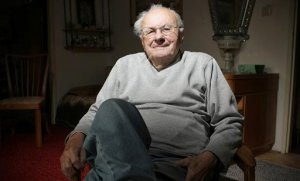
to 1978, when it became its primary prof. MUDr. Vladimir Benes I, Dr. Sc.. Until then, Nestor of the Czech Pediatric Neurosurgery had been performing superconsulting activities in this area even during his work at the original workplace - the ÚVN Neurosurgical Clinic in Střešovice. After the establishment of the department, there is a concentration of pediatric neurosurgical patients and a rapid development of neurosurgical treatment of children in its entire spectrum, especially in the field of surgical treatment of congenital malformations and cancer of the nervous system, neurotraumatology and hydrocephalus. Under his leadership, the workplace introduces a number of progressive and at that time unique procedures:
- In the field of developmental defects
- Method of active remodeling of craniosynostoses
- Surgical treatment of complex craniofacial defects
- Surgery of midline and deep tumors
- Tumors of the pineal landscape, basal ganglia and trunk
- Using progressive surgical approaches (eg transscalous approach)
- Hemisferectomy for epilepsy
The social culmination of this stage of the workplace and the appreciation of its activities was the organization of the World Congress of Pediatric Neurosurgery ISPN 1991 (International Society for Pediatric Neurosurgery) in Prague.
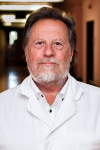 In July 1990, he became the head of the Neurosurgical Department of the Motol University Hospital MD Michal Tichý. In 2006, with the merger of the Neurosurgical Department of Adults, a joint neurosurgical department was created, and on 1.7.2012 July 2, the Department of Neurosurgery for Children and Adults of the XNUMXnd Medical Faculty of Charles University and the Motol University Hospital was established. The department continues to further develop in already established areas in the entire age range of patients (treatment of birth defects, oncoonosurgery, neurotraumatology, treatment of hydrocephalus) and introduces new programs:
In July 1990, he became the head of the Neurosurgical Department of the Motol University Hospital MD Michal Tichý. In 2006, with the merger of the Neurosurgical Department of Adults, a joint neurosurgical department was created, and on 1.7.2012 July 2, the Department of Neurosurgery for Children and Adults of the XNUMXnd Medical Faculty of Charles University and the Motol University Hospital was established. The department continues to further develop in already established areas in the entire age range of patients (treatment of birth defects, oncoonosurgery, neurotraumatology, treatment of hydrocephalus) and introduces new programs:
- Surgical treatment of spasticity of patients with cerebral palsy
- Minimally invasive procedures in degenerative spinal disorders
- Epileptosurgery
In September 2016, the workplace organizes a meeting of the world's leading epileptosurgeons ESTM 2016 (Epilepsy Surgery Techniques Meeting) held in connection with the 12th European Congress on Epileptology (ECE) organized under the auspices of the ILAE - International League Against Epilepsy.
1.10.2020 with the head of the Department of Neurosurgery for Children and Adults of the 2nd Faculty of Medicine, Charles University and Motol University Hospital doc. MUDr. Vladimir Benes III, Ph.D.
How to get here
Children's part
- Lower ground floor (SP) node C, children's part of the hospital (white building)
ICU | 22443 2554 | |
Standard department | 22443 2530 |
Adult part
- 1st floor node C, adult part of the hospital (blue building)
ICU | 22443 2533, 2532 | |
Standard department | 22443 2561, 2562 |
Children's ambulance
- Children's polyclinic, 3rd floor
Patient ordering Mon-Fri: 9,00:14.00 a.m. - XNUMX:XNUMX p.m. | 22443 2501 | petra.zajickova@fnmotol.cz |
Adult ambulance
- 3rd floor node A, adult part of the hospital (blue building) entrance Ocular complement
Patient ordering mon-fri 7,30 - 10,00 and 13,00 - 14,00 | 22443 2564, 2501 |
Research
Employees of the Department of Neurosurgery for Children and Adults, Motol University Hospital and the 2nd Medical Faculty of Charles University in Prague are actively involved in research in neuroscience and neurosurgical diseases and in the development of new treatment methods. and spinal cord. In cooperation with the Institute of Pathological Physiology, the Department of Neurosurgery has built a laboratory for experimental modeling and treatment of head injuries and an approved patent - a utility model of a new experimental device.
The most important research programs
International randomized, double-blind, controlled study evaluating rindopepime / GM-CSF adjuvanted temozolomide in patients with newly diagnosed EGFRvIII-positive glioblastoma after surgical resection (ACT IV Study)
International randomized controlled clinical trial evaluating the safety and efficacy of steam-heated and solvent / detergent-treated fibrin tissue adhesive (FS VH S / D 500 s-apr) compared to DuraSeal as an adjunct to closure in dural suture
Treatment of elevated intracranial pressure in craniotraumas by caffeine blockade of adenosine receptors - experimental study IGA NR 9514
Contribution of transcranial Doppler sonography for the diagnosis of functional changes after neurosurgical remodeling in craniosynostoses IGA NR 8264
Prevention of motor deficits after epileptosurgery in children NV15-30456A
Evaluation of suprasegmental effects of selective posterior risotomy NR8318
Neuropathological analysis of brain tissue of epileptic patients with drug-resistant epilepsy: correlation with proton magnetic resonance spectroscopy NF7411
Use of neuroendoscopy and laparoscopy in short-circuit operations for hydrocephalus ND7678
Posterior rhizotomy in the treatment of spastic form of cerebral palsy ND6305
Changes in the spectrum of amino acids in biological fluids and tissues in children with cancer IZ4349
Replacement of calf bone defects using autologous grafts and the "SPLIT SKULL" method - divided bone lobe IZ2909
Fetal brain tissue implantation in the treatment of Parkinson's disease, experimental methods and clinical application of IZ1176
The most important publications
The clinical utility of intraoperative electrocorticography in pediatric epilepsy surgical strategy and planning. Lesko R, Benova B, Jezdik P, Liby P, Jahodova A, Kudr M, Tichy M, Zamecnik J, Krsek P. J Neurosurg Pediatr. 2020 Jul 31: 1-10. doi: 10.3171 / 2020.4.PEDS20198
Structural volumetry in NPH diagnostics and treatment-future or dead end? Vlasak A, Skalicky P, Mladek A, Vrana J, Benes V, Bradac O. Neurosurg Rev. 2020 Jan 24. doi: 10.1007 / s10143-020-01245-y
Evolution of pediatric epilepsy surgery program over 2000-2017: Improvement of care? Belohlavkova A, Jezdik P, Jahodova A, Kudr M, Benova B, Maulisova A, Liby P, Vaculik M, Lesko R, Kyncl M, Zamecnik J, Tichy M, Komarek V, Krsek P. Eur J Neurol Pediatrician. 2019 May; 23 (3): 456-465. doi: 10.1016 / j.ejpn.2019.04.002.
Cognitive performance in distinct groups of children undergoing epilepsy surgery-a single-center experience. Benova B, Belohlavkova A, Jezdik P, Jahodova A, Kudr M, Komarek V, Novak V, Liby P, Lesko R, Tichý M, Kyncl M, Zamecnik J, Krsek P, Maulisova A. PeerJ. 2019 Oct 8; 7: e7790. doi: 10.7717 / peerj.7790
Sagittal craniosynostosis associated with midline cephalhematoma or vice versa, case report and a review of the literature. Liby P, Lomachinsky V, Felici G, Vaculik M, Krasnicanova H, Tichy M. Childs Nerv Syst. 2019 Apr; 35 (4): 729-732. doi: 10.1007 / s00381-018-4020
Generalized quasiperiodic epileptiform activity in sleep is associated with cognitive impairment in children with drug-resistant focal lesional epilepsy. Novak V, Maulisova A, Jezdik P, Benova B, Belohlavkova A, Liby P, Tichy M, Krsek P. Epilepsy. 2019 Nov; 60 (11): 2263-2276. doi: 10.1111 / epi.1636
Differential patterns of metastatic dissemination across medulloblastoma subgroups. Zapotocky M, Mata-Mbemba D, Sumerauer D, Liby P, Lassaletta A, Zamecnik J, Krskova L, Kyncl M, Stary J, Laughlin S, Arnoldo A, Hawkins C, Tabori U, Taylor MD, Bouffet E, Raybaud C, Ramaswamy V. J Neurosurg Pediatr. 2018 Feb; 21 (2): 145-152. doi: 10.3171 / 2017.8.PEDS17264
Injectable hydroxyphenyl derivative of hyaluronic acid hydrogel modified with RGD as scaffold for spinal cord injury repair. Zaviskova K, Tukmachev D, Dubisova J, Vackova I, Hejcl A, Bystronova J, Pravda M, Scigalkova I, Sulakova R, Velebny V, Wolfova L, Kubinova S. J Biomed Mater Res A. 2018 Apr; 106 (4): 1129-1140. doi: 10.1002 / jbm.a.36311
DTI-MRI biomarkers in the search for normal pressure hydrocephalus aetiology: a review. Hoza D, Vlasák A, Hořínek D, Sameš M, Alfieri A. Neurosurg Rev. 2015 Apr; 38 (2): 239-44; discussion 244. doi: 10.1007 / s10143-014-0584-0.
An effective strategy of magnetic stem cell delivery for spinal cord injury therapy. Tukmachev D, Lunov O, Zablotskii V, Dejneka A, Babic M, Sykova E, Kubinova S. Nanoscale. 2015 Mar 7; 7 (9): 3954-8
Bobble-head doll syndrome: therapeutic outcome and long-term follow-up in four children. Guerreiro H, Vlasak A, Horinek D, Tichy M, Lisy J, Vanek P, Liby P, Hoza D, Beneš V, Nimsky C. Acta Neurochir (Wien). 2012 Nov; 154 (11): 2043-9. doi: 10.1007 / s00701-012-1458-2.
Peripheral nerve stimulation in intractable neuropathic pain. Kozak J, Kobesova A, Vrba I, Steindler J, Kolar P. Neuro Endocrinol Lett. 2011; 32 (3): 226-33
Asymmetric dynamic cerebral autoregulatory response to cyclic stimuli. Aaslid R, Blaha M, Sviri G, Douville CM, Newell DW. Stroke. 2007 May; 38 (5): 1465-9. doi: 10.1161 / STROKEAHA.106.473462
Implanted vagus nerve stimulation in 126 patients: surgical technique and complications. Bláha M, Tichý M. Rozhl Chir. 2020 Summer; 99 (7): 304-310
The effect of caffeine on dilated cerebral circulation and on diagnostic CO2 reactivity testing. Blaha M, Benes V, Douville CM, Newell DW. J Clin Neurosci. 2007 May; 14 (5): 464-7
Hemorrhagic complications of intracranial pressure monitors in children. Blaha M, Lazar D, Winn RH, Ghatan S. Pediatrician Neurosurg. 2003 Jul; 39 (1): 27-31. doi: 10.1159 / 000070877
Cerebral blood flow and dynamic cerebral autoregulation during ethanol intoxication and hypercapnia. Blaha M, Aaslid R, Douville CM, Correra R, Newell DW. J Clin Neurosci. 2003 Mar; 10 (2): 195-8. doi: 10.1016 / s0967-5868 (02) 00126-1
Teaching
The Department of Neurosurgery teaches medics of the 2nd Medical Faculty of Charles University in the 6th year in a three-day block. Teaching for foreign students takes place in English. Students will get acquainted with the full range of the field of Neurosurgery, including practical skills and opportunities to participate in surgical procedures. The teacher from the Department of Neurosurgery is also part of the examination commission at the final state examination in surgery.
As part of postgraduate teaching at the Department of Neurosurgery, pre-certification clinical internships for physicians in the field of surgery, neurology, rehabilitation and psychiatry take place. The clinic also organizes and enables internships for beginning neurosurgeons in some neurosurgical subspecializations.
The Department of Neurosurgery for Children and Adults, Motol University Hospital and the 2nd Medical Faculty of Charles University in Prague is involved in the Ph.D. - Doctoral degree programs. These offer the highest formal education that can be achieved in the Czech Republic. There are four supervisors who prepare their students for the state doctoral examination and the defense of their dissertation in the field of Neuroscience and Experimental Surgery according to an individual study plan.
Trainers
- Doc. MUDr. Vladimir Benes, Ph.D. - Field of Neuroscience
- prof. MD RNDr. Ondřej Bradáč, Ph.D. - Department of Neuroscience
- Doc. MUDr. Petr Libý, Ph.D. - Field of study Experimental Surgery
- Doc. MUDr. Michal Tichý, CSc. - Field of study Experimental Surgery
Contact
| name | phone | ||
| The head | doc. MUDr. Vladimir Benes, Ph.D. | 22443 2501 | vladimir.benes@fnmotol.cz |
| Deputy Head | prof. MD RNDr. Ondřej Bradáč, Ph.D. | 22443 2504 | ondrej.bradac2@fnmotol.cz |
| Head nurse | Bc. Tereza Drbohlavová | 22443 2505 | tereza.drbohlavova2@fnmotol.cz |
Secretariat |
|||
| Children's part: | Petra Zajíčková | 22443 2501 fax. 2520 | petra.zajickova@fnmotol.cz |
| Adult part: | Tereza Šetinová | 22443 2504 fax. 2521 | tereza.setinova@fnmotol.cz |





